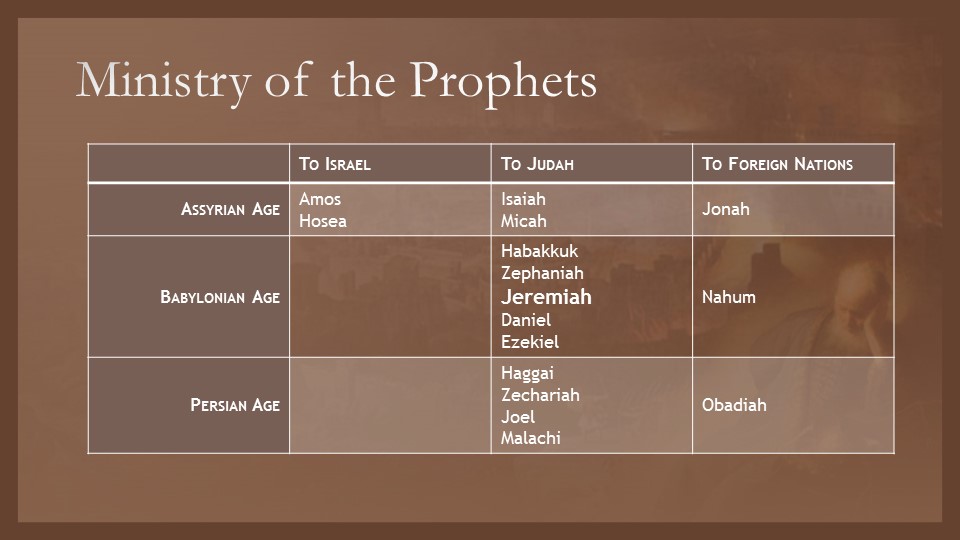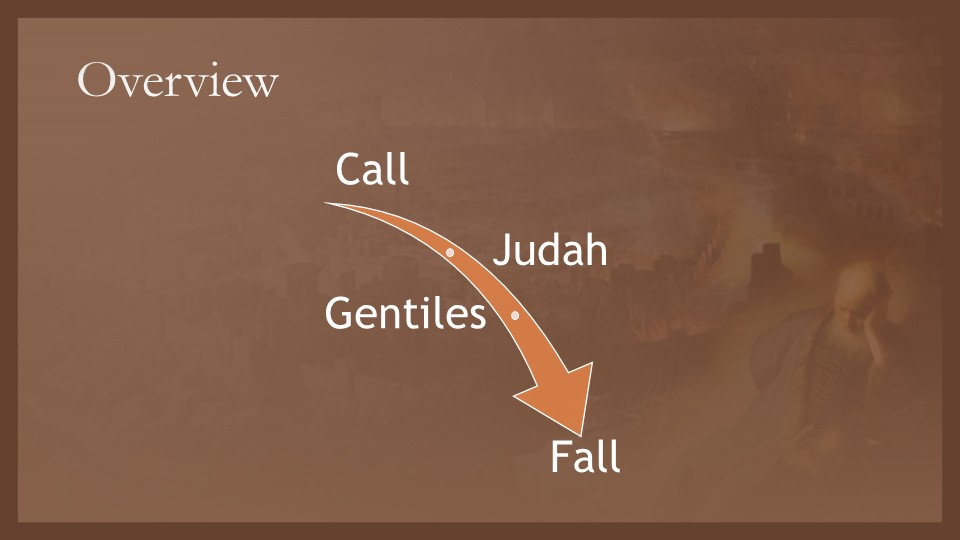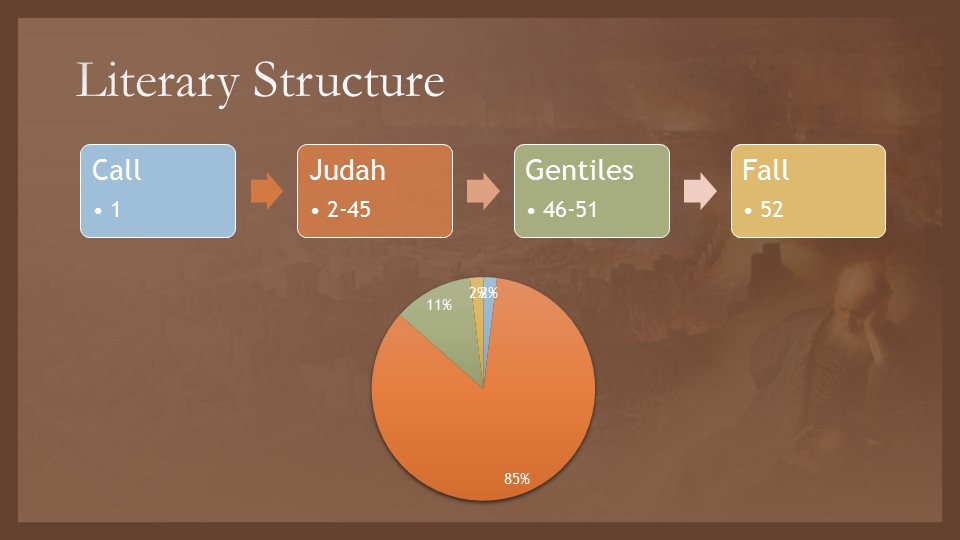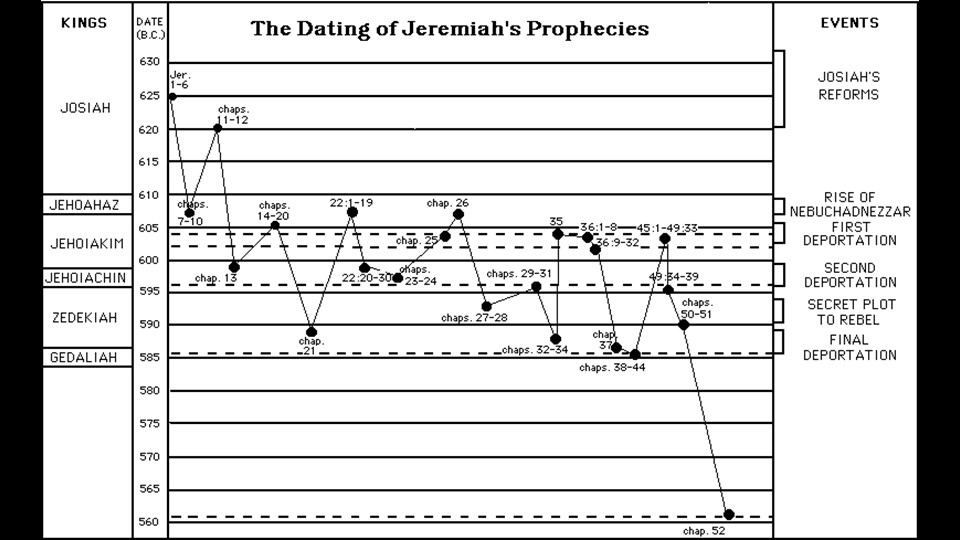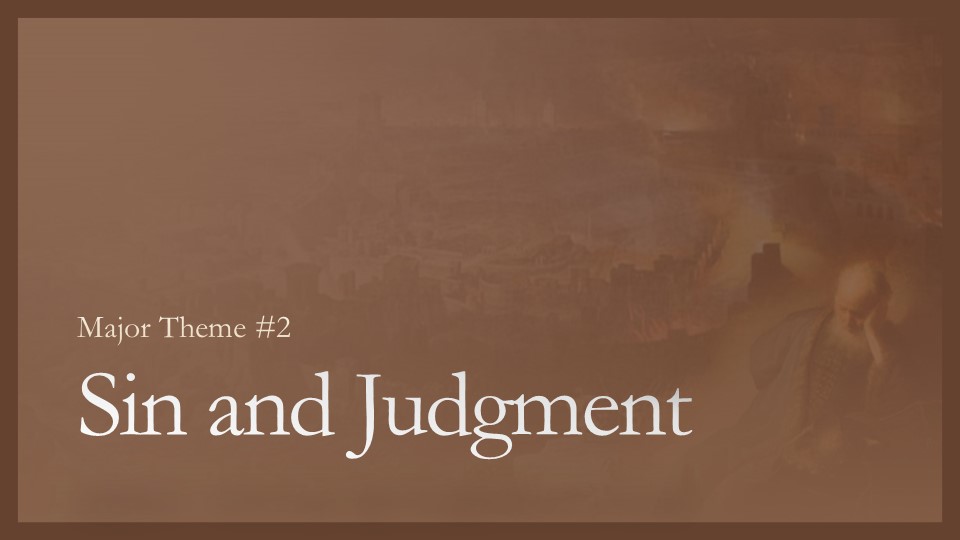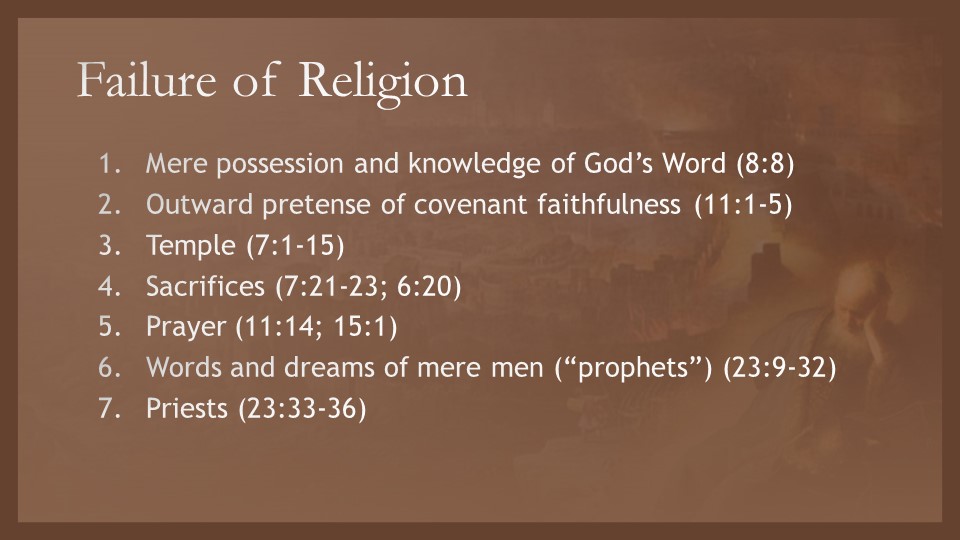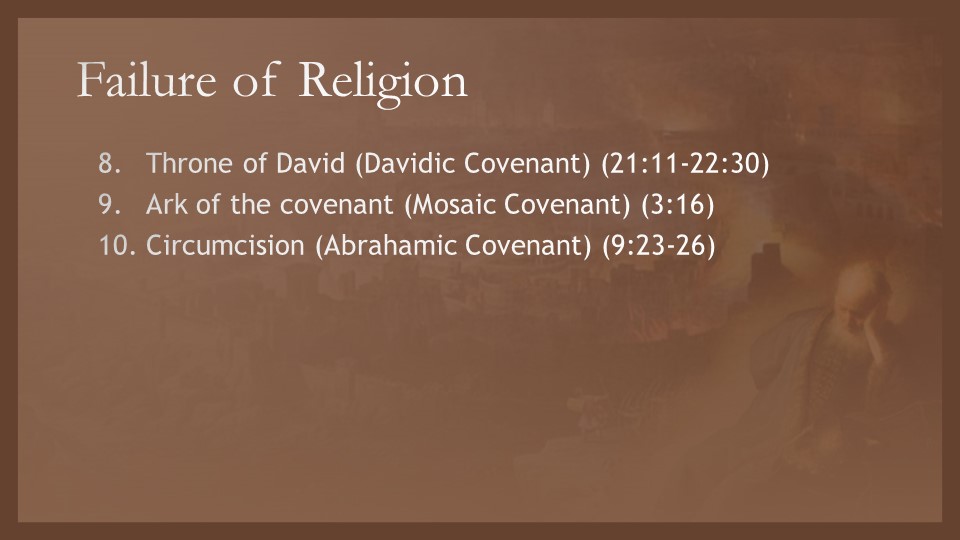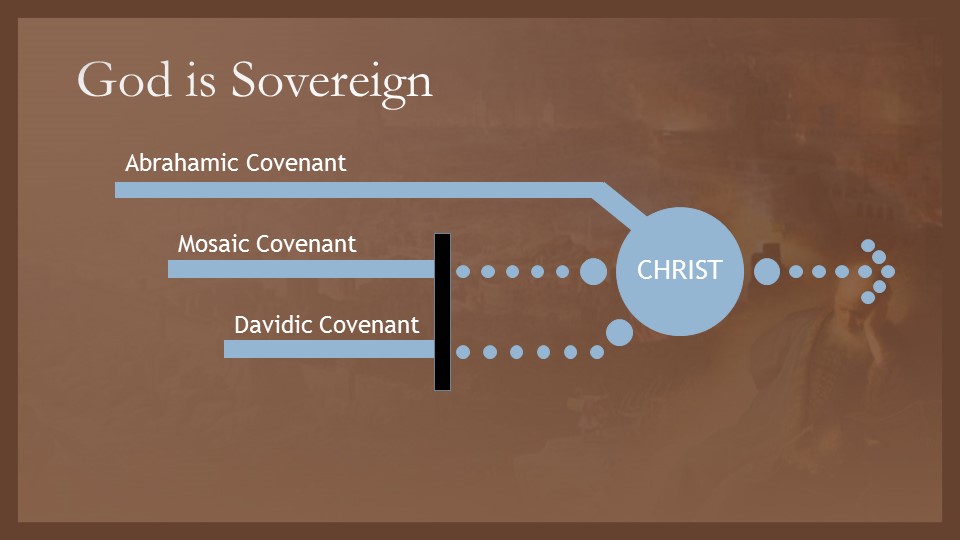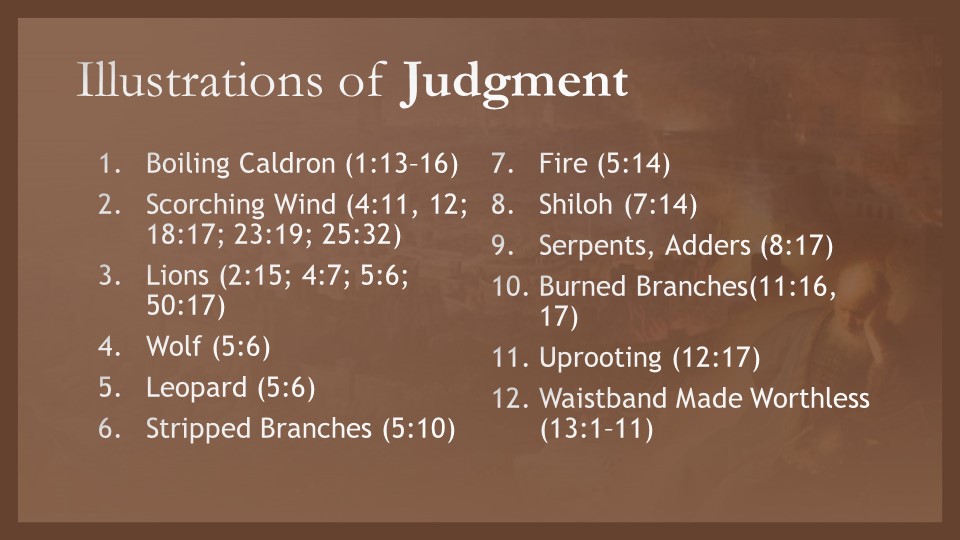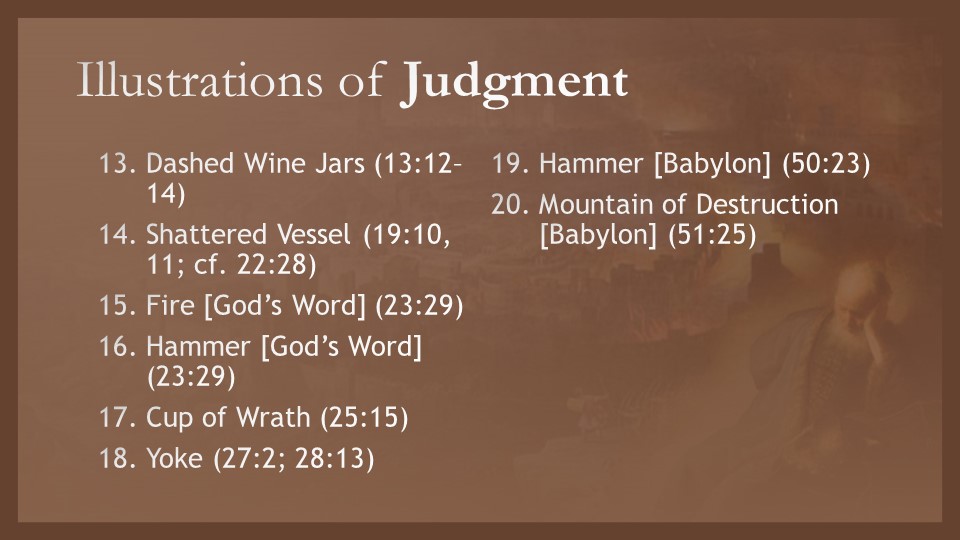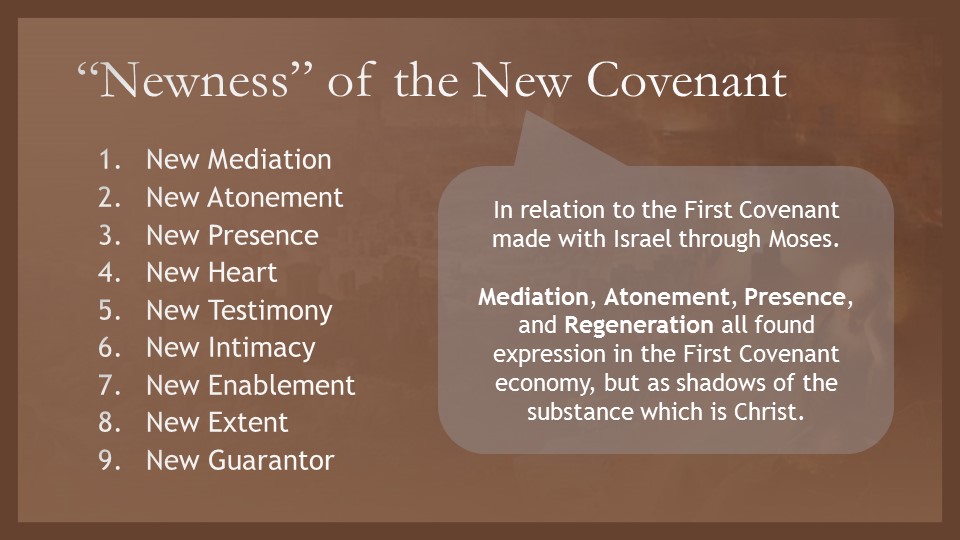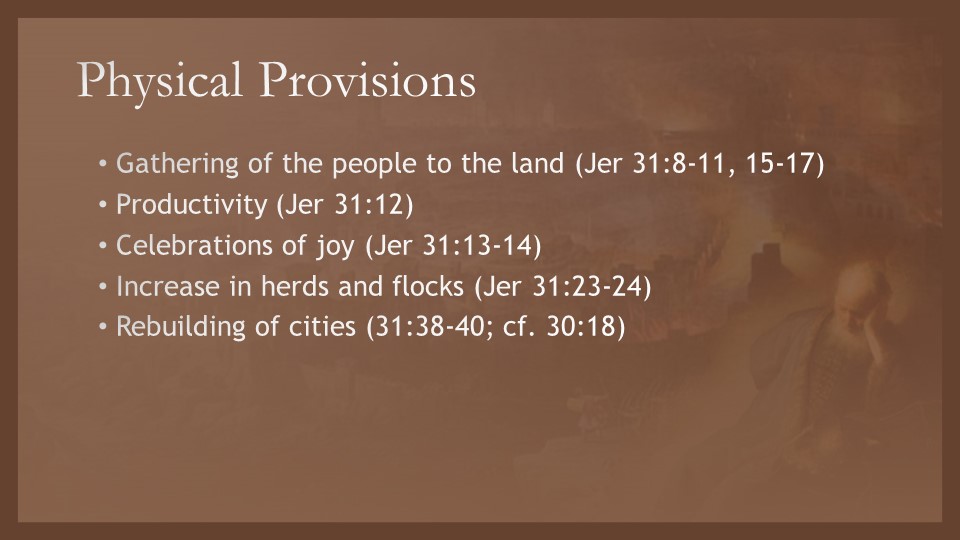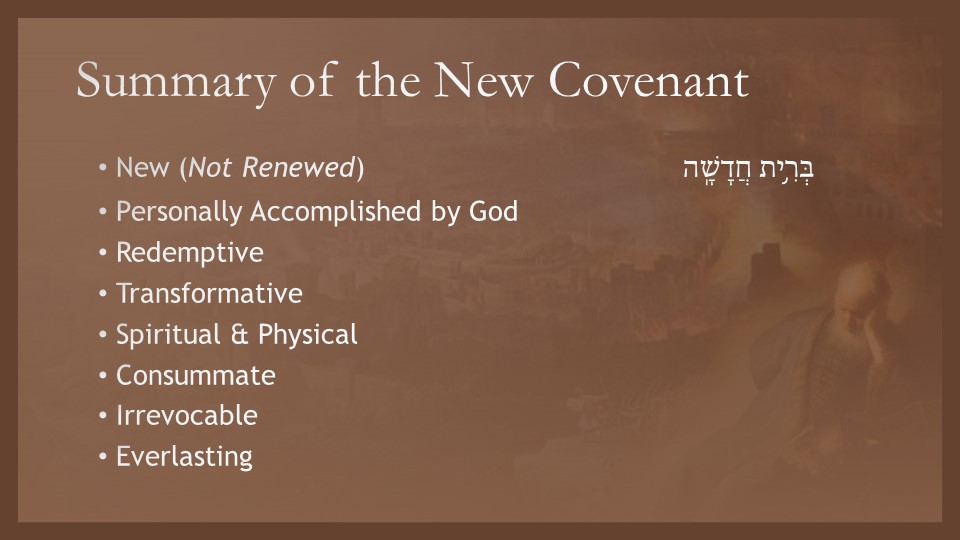Jeremiah is a very important book. Yet the book of this prophecy is estimated to be one of the least preached books in the Bible. While it is a very significant book, relevant for our times, it is numbered among the least known. Perhaps one of the chief reasons for this is owing to the fact that Jeremiah does not deliver a happy message. Many of the sad failures evident in the church today are characteristic of the failures of Israel of old—failures that receive strong divine rebuke in the Book of Jeremiah. It is not a happy but a heavy message. Nevertheless, it is a message that contains gloriously weighty hope.
There is much to learn from the principles set forth in this important book. There is much to learn from a message of heaviness and true hope in the midst of a culture of feather-weight lightness and false hope. Primarily what we need to learn from this book are certain glorious truths about God and God’s people.
Author and Date
Jeremiah the prophet, son of Hilkiah, from the small village of Anathoth (Jer 1:1) is the author of this great book.
Jeremiah's ministry spanned five decades, from King Josiah's 13th year (627 B.C.) to beyond the fall of Jerusalem in 586 B.C. It is possible that Jeremiah lived as late as 561 B.C. collating his work during captivity in Babylon.
Purpose
To reveal God as preeminently sovereign and expose man as utterly without excuse. To reprove and rebuke Judah for her unfaithfulness to the Lord, her spiritual husband, and to call her to repentance. To warn with deep heaviness of the terrible and awesome judgments of God against sin in general and idolatry, religious hypocrisy, injustice, and immorality in particular. To proclaim tremendously high hopes for Judah, Israel, and the nations through the love, faithfulness, and sin-forgiving mercy of God. To promise a New Covenant, a new David, new hearts, future forgiveness, and future restoration. To urge purity of heart and perseverance of hope in those who have ears to hear.
Devotionals
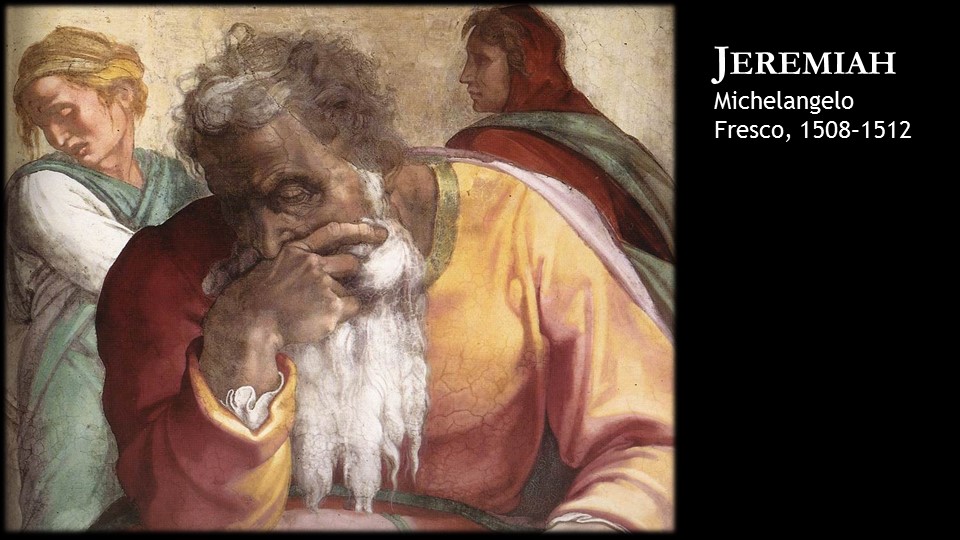
"Weeping Prophet"
There is more autobiographic material furnished by Jeremiah than any other prophet. He writes more extensively about his circumstances because his life and ministry were characteristically more painful.
Jeremiah is a prophet of the classical period. The prophet is a mouthpiece of the living God to a dying people. He is a spiritual and social commentator burdened with the weight of a divine word. His message is primarily one of rebuke in consequence to the current condition and spiritual state of an idolatrous people. The nature of the message he bears betrays the heart-cry of God, as a fountain of agony launching warning after warning of captivity, destruction, and exile. But just as justice does not exhaust the heart of God, so these prophecies speak not only of judgment but proclaim promise! Eventual restoration is held forth as a demonstration of the mercy and grace of God and a cause for rejoicing in repentance and sanctification. Inward anarchies are indicted and called to account as the clarion for justice and repentance are sounded.
It has well been said that “Jeremiah is the autobiography of one of Judah’s greatest prophets during the nation’s darkest days. Apostasy, idolatry, perverted worship, moral decay—these were the conditions under which Jeremiah lived and ministered. An avalanche of judgment is coming, and Jeremiah is called to proclaim that message faithfully for forty years. In response to his sermons, the tender prophet of God experiences intense sorrows at the hands of his countrymen: opposition, beatings, isolation, imprisonment. But though rejected and persecuted, Jeremiah lives to see many of his prophecies come true. The Babylonian army arrives; vengeance falls; and God’s holiness and justice are vindicated, though it breaks the prophet’s heart.” (Boa, 197).
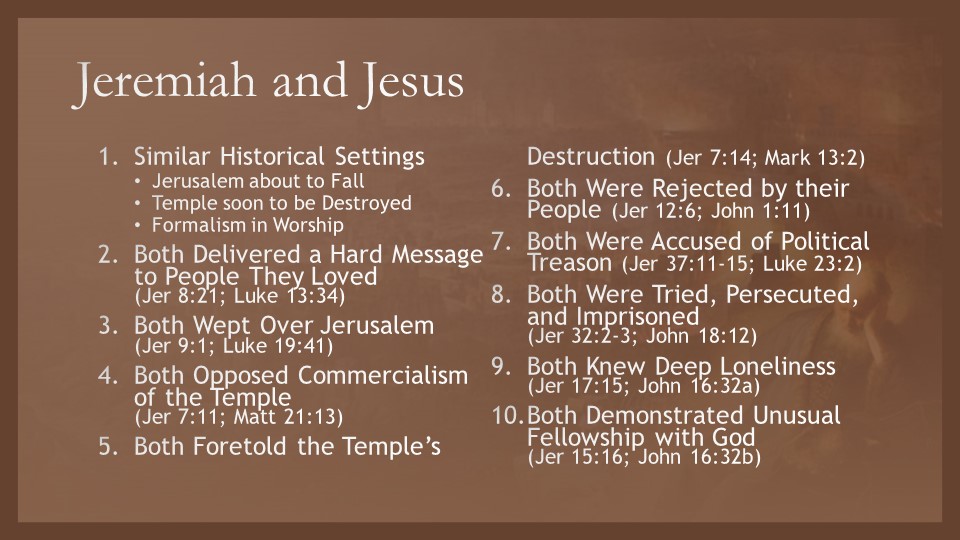
Jeremiah and Jesus
In Matthew 16, we learn that some of the people of Israel were identifying Jesus with the prophet Jeremiah: “Now when Jesus came into the district of Caesarea Philippi, he asked his disciples, ‘Who do people say that the Son of Man is?’ And they said, ‘Some say John the Baptist, others say Elijah, and others Jeremiah or one of the prophets.’” (Matt 16:13–14). John the Baptist and Elijah were both alike in that they were prophets designated to usher in the Messiah and the age of His reign. The odd name given is Jeremiah. Why would the people of Jesus' day identify Him with Jeremiah?
There are at least ten clear similarities between Jeremiah and Jesus:
- Similar Historical Settings
- Jerusalem about to Fall
- Temple soon to be Destroyed
- Formalism in Worship
- Both Delivered a Hard Message to People They Loved (Jer 8:21; Luke 13:34)
- Both Wept Over Jerusalem (Jer 9:1; Luke 19:41)
- Both Opposed Commercialism of the Temple (Jer 7:11; Matt 21:13)
- Both Foretold the Temple’s Destruction (Jer 7:14; Mark 13:2)
- Both Were Rejected by their People (Jer 12:6; John 1:11)
- Both Were Accused of Political Treason (Jer 37:11-15; Luke 23:2)
- Both Were Tried, Persecuted, and Imprisoned (Jer 32:2-3; John 18:12)
- Both Knew Deep Loneliness (Jer 17:15; John 16:32a)
- Both Demonstrated Unusual Fellowship with God (Jer 15:16; John 16:32b)
Jeremiah is one of the most used, and sometimes abused, books of the Bible employed to castigate apostate Christianity in America. The misuse of the Book of Jeremiah is often owing to confusion over Israel and the Church. We must keep in mind, for instance, that Israel should not be equated to any nation on earth—including America. While God deals with and continues to judge nations, the explicit message of Jeremiah is addressed to the uniquely theocratic nation of Israel.
But we must also be careful not to fail in our apprehension of the principles clearly given in this book. We must labor to discover, understand, and apply the principles contained in this treasury. So when we read, we read Jeremiah with an eye to principle, not prescription.
While our situation today and our nation is very different, we should readily see that: (a) the character of God is not different and (b) the people of God, in many ways, are not different. Key to understanding and application, then, is: (a) look for principles concerning God and (b) the people of God.
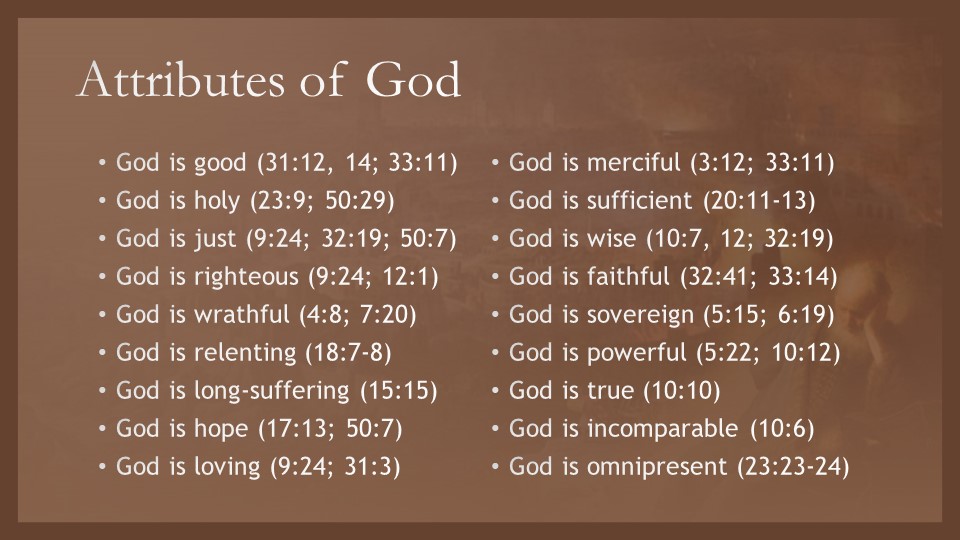
Attributes of God
-
God is good (Jer 31:12, 14; 33:11)
God is holy (Jer 23:9; 50:29)
God is just (Jer 9:24; 32:19; 50:7)
God is righteous (Jer 9:24; 12:1)
God is wrathful (Jer 4:8; 7:20)
God is relenting (Jer 18:7-8)
God is long-suffering (Jer 15:15)
God is hope (Jer 17:13; 50:7)
God is loving (Jer 9:24; 31:3)
God is merciful (Jer 3:12; 33:11)
God is sufficient (Jer 20:11-13)
God is wise (Jer 10:7, 12; 32:19)
God is faithful (Jer 32:41; 33:14)
God is sovereign (Jer 5:15; 6:19)
God is powerful (Jer 5:22; 10:12)
God is true (Jer 10:10)
God is incomparable (Jer 10:6)
God is omnipresent (Jer 23:23-24)
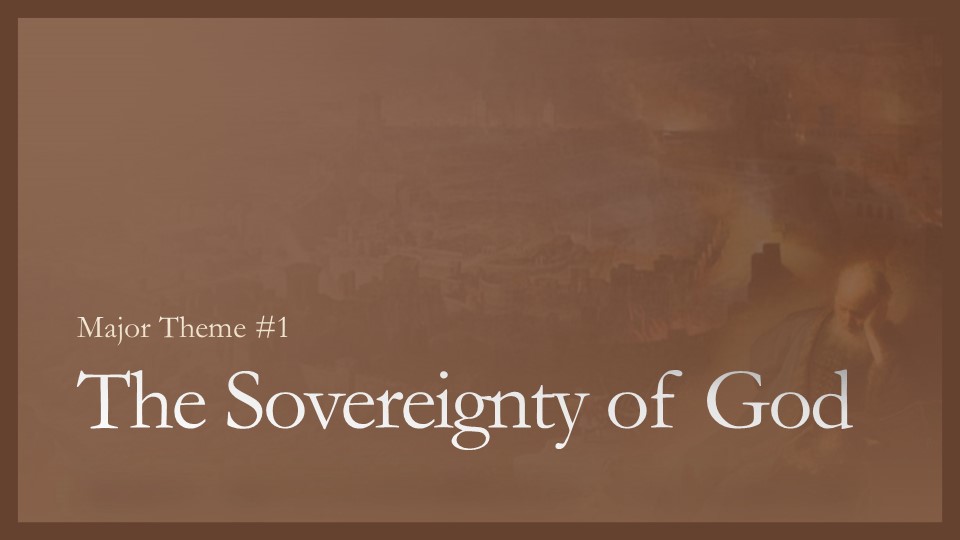
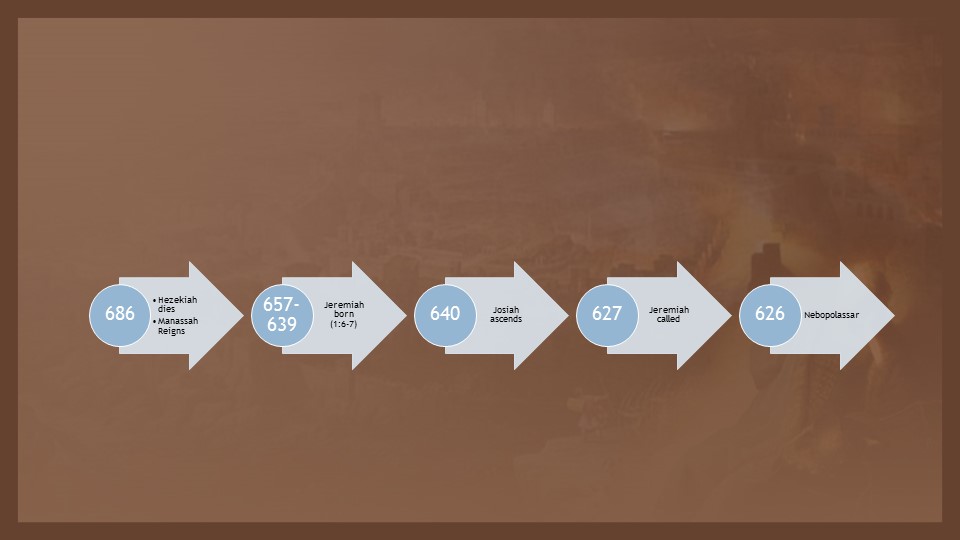
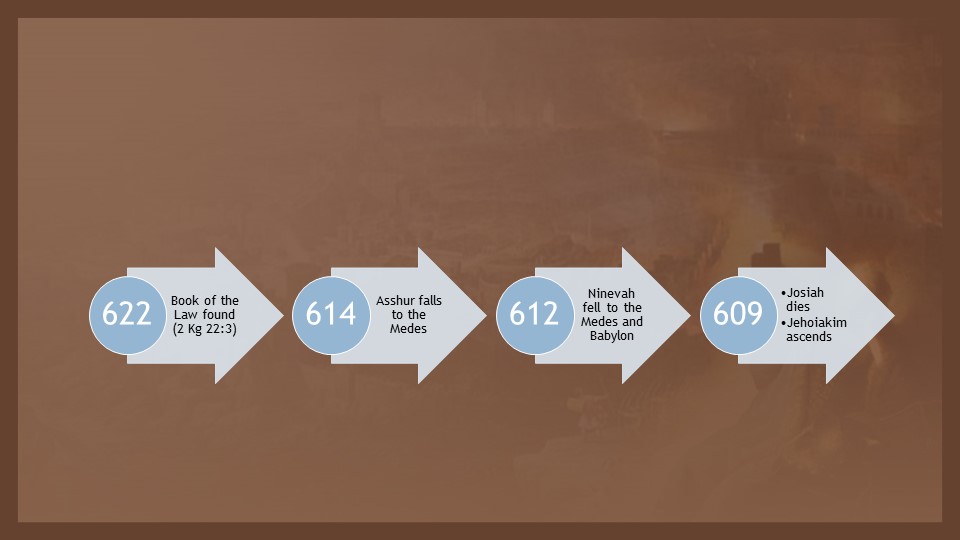
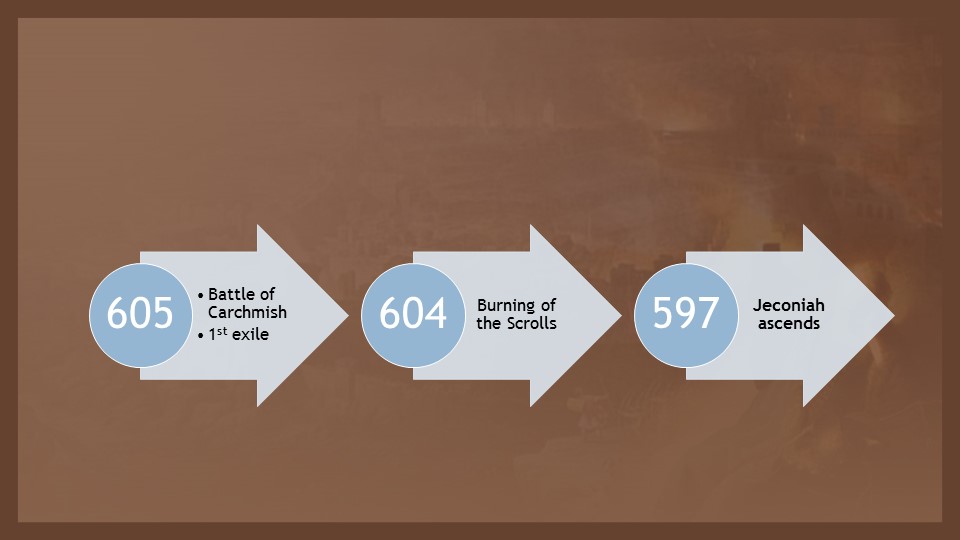
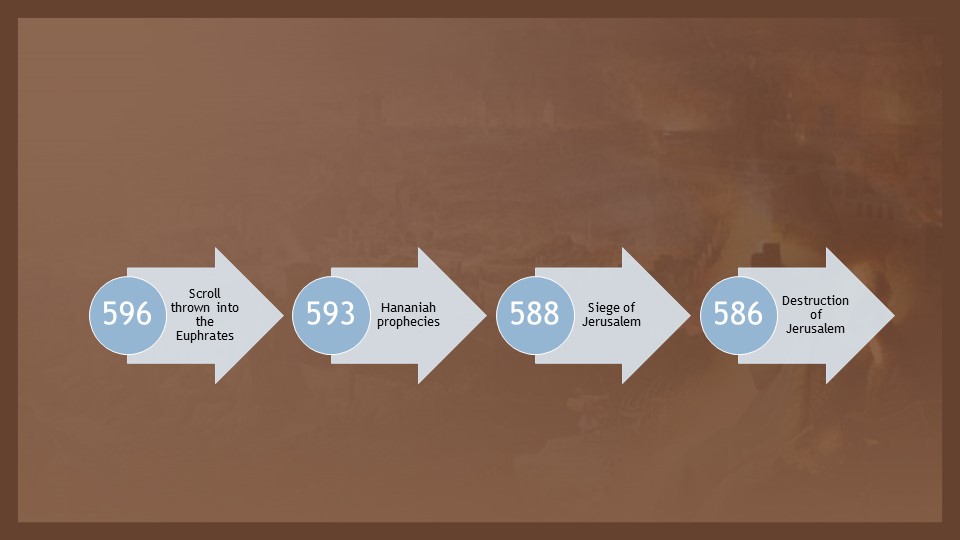
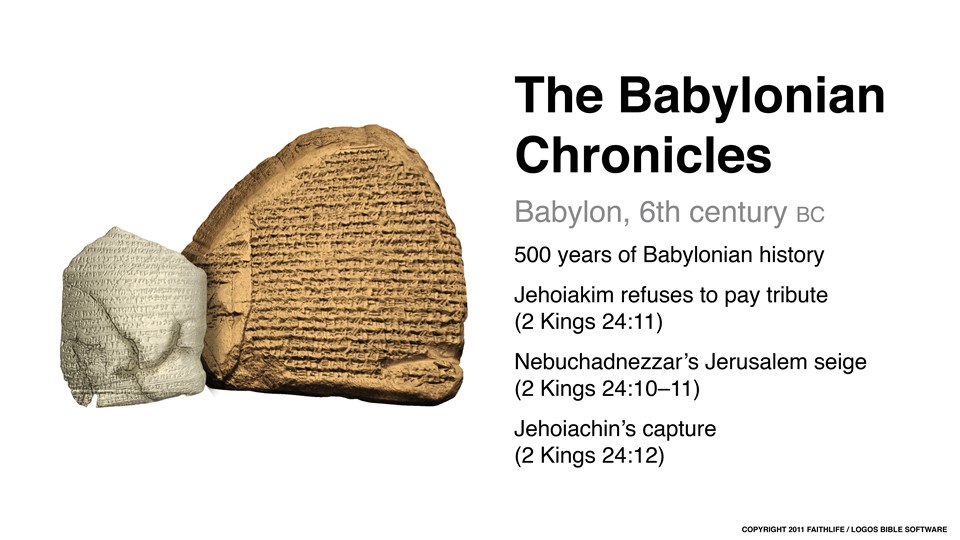
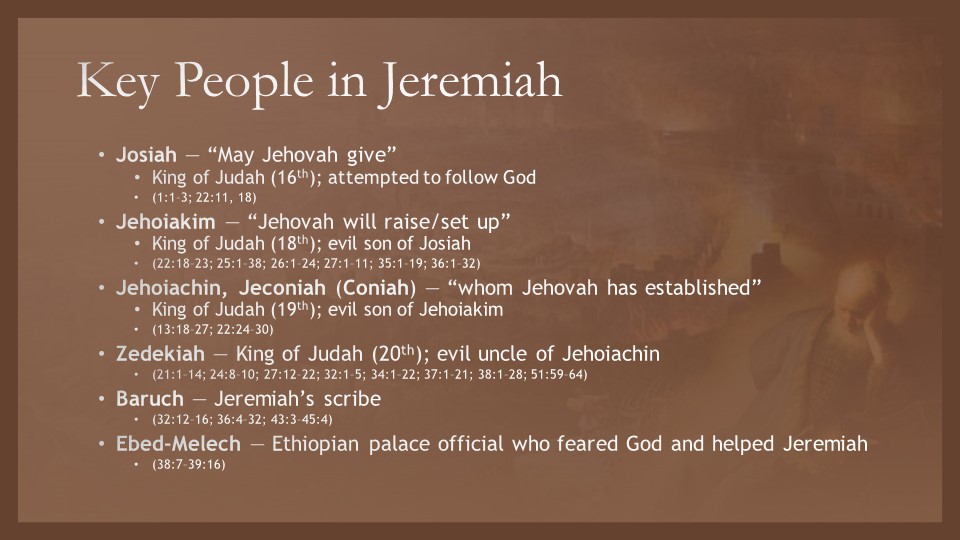
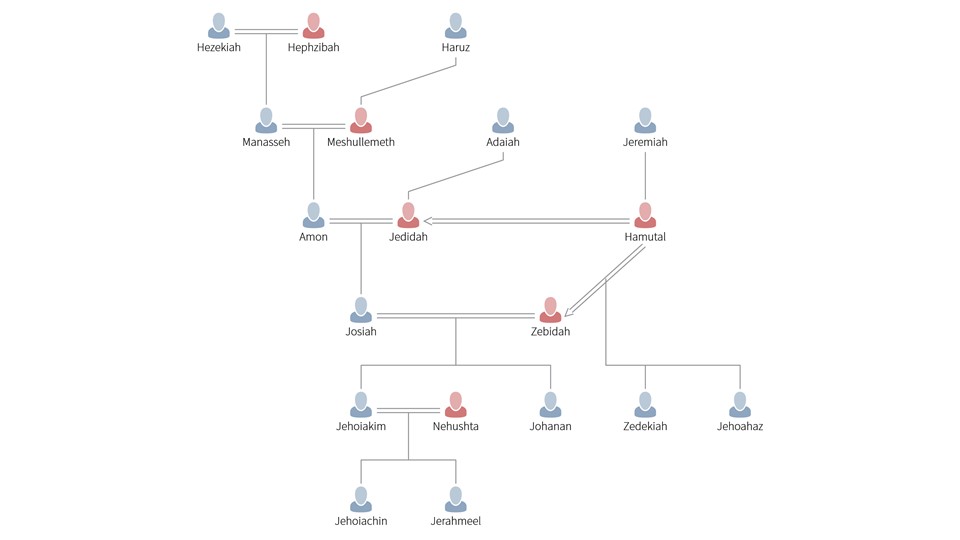
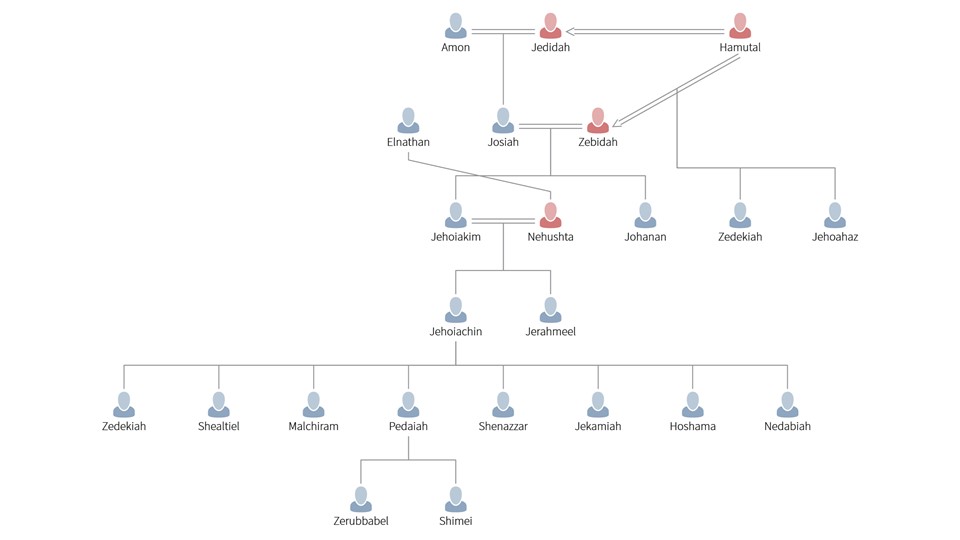
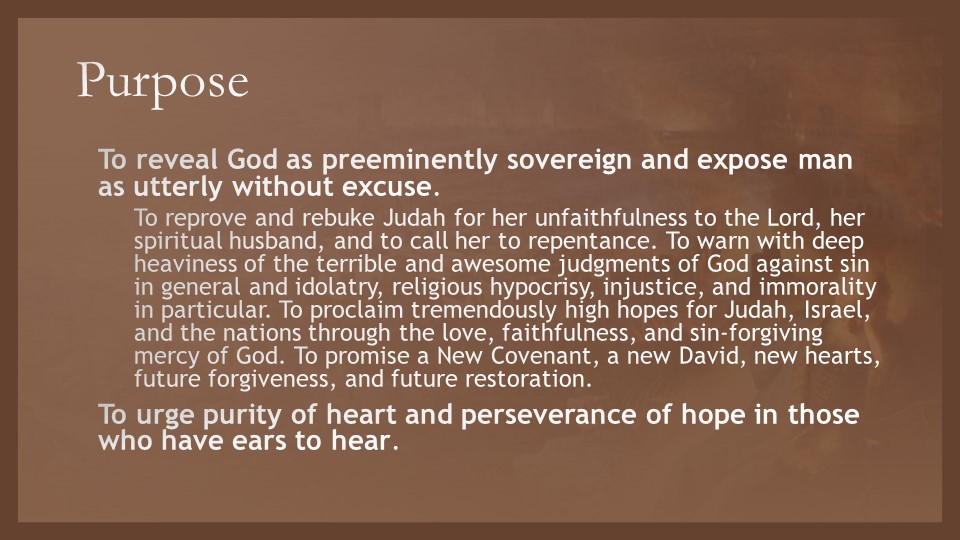
Purpose of the Book
To reveal God as preeminently sovereign and expose man as utterly without excuse. To reprove and rebuke Judah for her unfaithfulness to the Lord, her spiritual husband, and to call her to repentance.
...
To urge purity of heart and perseverance of hope in those who have ears to hear.
What Sustained Jeremiah?
"What was it that sustained him throughout a lifetime of grief and opposition? Simply this: he had an undying confidence in God and his promises (18:7; 29:14; 32:1–15). The two focuses of his life and ministry were God—his goodness, his claims on man, his requirements of repentance and faith—and his wayward people—their welfare, physically and spiritually" (Feinberg, 368).
- Almond Tree (Jer 1:11-12) → God's word will blossom
- Pot (Jer 1:13-16) → God's judgment will be poured out
- Pillar (Jer 1:17-19) → God's prophet will be made to stand firm

Sovereignty of God
(Jeremiah 1:10; 5:15, 22, 24; 6:19, 21; 7:1-15; 9:7-11, 15-16; 10:12-16, 18; 13:9, 13; 14:22; 16:9, 18; 17:5-10; 18:6-12, 17; 19:3, 15; 21:3-7; 23:3-6; 25:8-13, 15-38; 27:5-8; 29:17-19, 31-32; 30:3, 8-11, 15, 17, 18-24; 31:1-3, 4, 8; 32:37-44; 33:5-9; 39:16-18; 42:1-22; 50:18-20; 51:1-2, 15-19)
What is emphasized is how the Word of the Lord came to Jeremiah. "I am watching over My word to bring it to pass" (Jer 1:12).
God is behind all that is taking place. He is watching over His word to perform it. Jeremiah will speak again and again about what God is doing.
- Jeremiah 5:15 - Behold, I am bringing against you a nation from afar, O house of Israel, declares the LORD. It is an enduring nation; it is an ancient nation, a nation whose language you do not know, nor can you understand what they say.
- Jeremiah 21:2 - “Inquire of the LORD for us, for Nebuchadnezzar king of Babylon is making war against us. Perhaps the LORD will deal with us according to all his wonderful deeds and will make him withdraw from us.”
- Zedekiah: “God's on our side right?”
Answer: NO. In fact, I am the One who is acting. - Je 21:3–7 - Then Jeremiah said to them: “Thus you shall say to Zedekiah, [4] ‘Thus says the LORD, the God of Israel: Behold, I will turn back the weapons of war that are in your hands and with which you are fighting against the king of Babylon and against the Chaldeans who are besieging you outside the walls. And I will bring them together into the midst of this city. [5] I myself will fight against you with outstretched hand and strong arm, in anger and in fury and in great wrath. [6] And I will strike down the inhabitants of this city, both man and beast. They shall die of a great pestilence. [7] Afterward, declares the LORD, I will give Zedekiah king of Judah and his servants and the people in this city who survive the pestilence, sword, and famine into the hand of Nebuchadnezzar king of Babylon and into the hand of their enemies, into the hand of those who seek their lives. He shall strike them down with the edge of the sword. He shall not pity them or spare them or have compassion.’
Neb. is “MY” instrument. - Je 6:19 -19 Hear, O earth; behold, I am bringing disaster upon this people, the fruit of their devices, because they have not paid attention to my words; and as for my law, they have rejected it.
- Je 9:11 - I will make Jerusalem a heap of ruins, a lair of jackals, and I will make the cities of Judah a desolation, without inhabitant.”
- Je 10:18 - For thus says the LORD: “Behold, I am slinging out the inhabitants of the land at this time, and I will bring distress on them, that they may feel it.”
- Je 13:9 - “Thus says the LORD: Even so will I spoil the pride of Judah and the great pride of Jerusalem.
- Je 18:11–12 - Now, therefore, say to the men of Judah and the inhabitants of Jerusalem: ‘Thus says the LORD, Behold, I am shaping disaster against you and devising a plan against you. Return, every one from his evil way, and amend your ways and your deeds.’ [12] “But they say, ‘That is in vain! We will follow our own plans, and will every one act according to the stubbornness of his evil heart.’
- Je 29:11 - For I know the plans I have for you, declares the LORD, plans for welfare and not for evil, to give you a future and a hope.
- Jeremiah 29:14 - I will be found by you, declares the LORD, and I will restore your fortunes and gather you from all the nations and all the places where I have driven you, declares the LORD, and I will bring you back to the place from which I sent you into exile.
- Je 30:18–19 - “Thus says the LORD: Behold, I will restore the fortunes of the tents of Jacob and have compassion on his dwellings; the city shall be rebuilt on its mound, and the palace shall stand where it used to be. [19] Out of them shall come songs of thanksgiving, and the voices of those who celebrate. I will multiply them, and they shall not be few; I will make them honored, and they shall not be small.
- Je 31:1 - “At that time, declares the LORD, I will be the God of all the clans of Israel, and they shall be my people.”
- Je 31:4 - Again I will build you, and you shall be built, O virgin Israel! Again you shall adorn yourself with tambourines and shall go forth in the dance of the merrymakers.
- Je 50:18 - Therefore, thus says the LORD of hosts, the God of Israel: Behold, I am bringing punishment on the king of Babylon and his land, as I punished the king of Assyria.
In the end, God is sovereign over everything—from start to finish. He is the reason for the heaviness and He is the reason for the hope. My prayer is that we would appropriate that the way it was intended: with a sensitive heart, to understand that we don't take sin lightly and we are accountable as a group of people before the Lord.
Sin and Judgment of Judah
Jeremiah reflects an intimacy with the heart of God, as he personally demonstrated an intense and unrelenting hatred of sin. He parades over and over again concerning the spiritual rebellion of his people—a people he loves.
"He scrutinized the political, social, moral, and spiritual life of the people. Prophets, priests, kings, nobles—even relatives—could expect no favoritism from him (cf. 5:1–5; 13:1–14; 23:1–4; 22:13–19)" (Feinberg, 371).
Key to Judgment: COVENANT
God does not delight in judgment and destruction! The Lord's legal testimony against His unfaithful bride: "Therefore I still contend with you, declares the LORD, and with your children's children I will contend" (Jer 2:9).
Chapter 2
Je 2:1–2 - The word of the LORD came to me, saying, [2] “Go and proclaim in the hearing of Jerusalem, Thus says the LORD, “I remember the devotion of your youth, your love as a bride, how you followed me in the wilderness, in a land not sown.
Wife: devoted to your husband
— חֶסֶדunbroken promises, unshakable loyalty, unceasing devotion, unfailing loving-kindness, deep abiding commitment, faithfulness. “It is more than a legal contract; it is a steadfast love commitment of fidelity and adoration.”
We are legalists at heart. Keeping God’s word is not a matter of mere obedience to a set of rules. It truly is about a relationship with your Creator and Savior. Obedience flows out of love; not the other way around. Notice how “you followed” comes after “your love”? It was the demonstration of love, not the creation of it.
Husband:
- passion: Je 2:3 - Israel was holy to the LORD, the firstfruits of his harvest. ...
- protection: Je 2:3 - ... All who ate of it incurred guilt; disaster came upon them, declares the LORD.”
- provision: Je 2:7 - And I brought you into a plentiful land to enjoy its fruits and its good things. ...
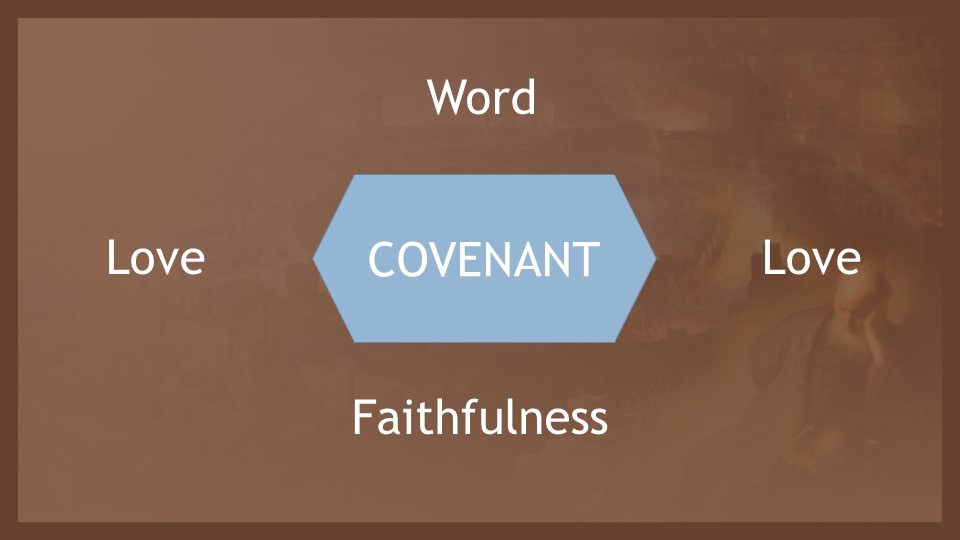
Je 2:4–7 - Hear the word of the LORD, O house of Jacob, and all the clans of the house of Israel. [5] Thus says the LORD: “What wrong did your fathers find in me that they went far from me, and went after worthlessness, and became worthless? [6] They did not say, ‘Where is the LORD who brought us up from the land of Egypt, who led us in the wilderness, in a land of deserts and pits, in a land of drought and deep darkness, in a land that none passes through, where no man dwells?’ [7] And I brought you into a plentiful land to enjoy its fruits and its good things. But when you came in, you defiled my land and made my heritage an abomination.
Je 2:17 - Have you not brought this upon yourself by forsaking the LORD your God, when he led you in the way?
“Why would anyone ever move away from God? It makes no sense! Why would a bride leave a perfect husband? Why would she abandon a spouse who fulfilled all his vows to her? There is no explanation, no excuse. God’s bride separated from her husband without the slightest provocation.” (Ryken, 39).
The heart!
They no longer recount and no longer recite the graces of God; the mighty acts of His salvation. They forget the love that saved them.
“The road to spiritual adultery begins when you stop reveling in the love of God. Few Christians plan to fall into grievous sin. It is only after falling that they realize they have drifted away from the God of love.” (Ryken, 40).
Immorality always follows idolatry, since morality is no less than the express allegiance of our worship. Value self above all else and your morality will follow whatever self deems as right.
Idolatry == Spiritual Adultery
Je 7:31 - And they have built the high places of Topheth, which is in the Valley of the Son of Hinnom, to burn their sons and their daughters in the fire, which I did not command, nor did it come into my mind.
Je 32:35 - They built the high places of Baal in the Valley of the Son of Hinnom, to offer up their sons and daughters to Molech, though I did not command them, nor did it enter into my mind, that they should do this abomination, to cause Judah to sin.
Je 44:18 - But since we left off making offerings to the queen of heaven [Ishtar] and pouring out drink offerings to her, we have lacked everything and have been consumed by the sword and by famine.”
Je 32:34 - They set up their abominations in the house that is called by my name, to defile it.
Take to heart the imagery. This would be like placing a picture of your mistress on your bedroom nightstand.

Covenant
We cannot understand God's judgment in Jeremiah without first understanding the depth of meaning in covenant. Before we can understand judgment, we need to understand the nature of sin. Much error has occurred in the hearts of people, whether in the church or outside of the church, because they see judgment and they do not rightly understand the nature of sin. Therefore they falsely assess judgment.
What we need to see is that sin is (1) personal, (2) relational, and (3) "cardial" (a matter of the heart).
Sin is not a religious matter. Fundamentally, sin is a personal, relational, and affectional issue, not a matter of rules, mere morals, or religious beliefs and duties.
Dt 6:4–5 - “Hear, O Israel: The LORD our God, the LORD is one. [5] You shall love the LORD your God with all your heart and with all your soul and with all your might.
Dt 10:12 - “And now, Israel, what does the LORD your God require of you, but to fear the LORD your God, to walk in all his ways, to love him, to serve the LORD your God with all your heart and with all your soul,
Dt 11:1 - “You shall therefore love the LORD your God and keep his charge, his statutes, his rules, and his commandments always.
(See Dt 27-28)
Dt 30:19–20 - I call heaven and earth to witness against you today, that I have set before you life and death, blessing and curse. Therefore choose life, that you and your offspring may live, [20] loving the LORD your God, obeying his voice and holding fast to him, for he is your life and length of days, that you may dwell in the land that the LORD swore to your fathers, to Abraham, to Isaac, and to Jacob, to give them.”
Jeremiah 11:10 - They have turned back to the iniquities of their forefathers, who refused to hear my words. They have gone after other gods to serve them. The house of Israel and the house of Judah have broken my covenant that I made with their fathers.
Jeremiah 11:14 - “Therefore do not pray for this people, or lift up a cry or prayer on their behalf, for I will not listen when they call to me in the time of their trouble.
Jer 11:18-23 → Don’t like the message, kill the messenger. Because God judges righteously, and not corruptly, judgment is inevitable! → ch 12: Jeremiah doesn’t want to be the Lord’s prophet! Worse things are going to come! … Even the Davidic covenant is broken!
Je 22:8–9 - “ ‘And many nations will pass by this city, and every man will say to his neighbor, “Why has the LORD dealt thus with this great city?” [9] And they will answer, “Because they have forsaken the covenant of the LORD their God and worshiped other gods and served them.” ’ ”
Jeremiah 22:30 - Thus says the LORD: “Write this man down as childless, a man who shall not succeed in his days, for none of his offspring shall succeed in sitting on the throne of David and ruling again in Judah.”
There is a false assumption on the part of Israel, that despite the world affairs, everything is alright and will blow-over.
JEREMIAH'S CARDIOLOGY
What is at the center of Judah's demise? They are blind to their own sin. They do not discern their own hearts.
God Wants Your Heart
Jeremiah 11:20 - But, O LORD of hosts, who judges righteously, who tests the heart and the mind, let me see your vengeance upon them, for to you have I committed my cause.
Je 12:3 - But you, O LORD, know me; you see me, and test my heart toward you. Pull them out like sheep for the slaughter, and set them apart for the day of slaughter.
- Ps 139:23 - Search me, O God, and know my heart! Try me and know my thoughts!
- Job 13:23 - How many are my iniquities and my sins? Make me know my transgression and my sin.
The "Natural" Heart is an Unregenerate Heart
Notice how motion is linked to nature. Motion pictures the draw of affections.
- Jeremiah 3:10 - Yet for all this her treacherous sister Judah did not return to me with her whole heart, but in pretense, declares the LORD.”
- Jeremiah 3:17 - At that time Jerusalem shall be called the throne of the LORD, and all nations shall gather to it, to the presence of the LORD in Jerusalem, and they shall no more stubbornly follow their own evil heart.
- Je 5:23–24 - But this people has a stubborn and rebellious heart; they have turned aside and gone away. [24] They do not say in their hearts, ‘Let us fear the LORD our God, who gives the rain in its season, the autumn rain and the spring rain, and keeps for us the weeks appointed for the harvest.’
- Je 7:24 - But they did not obey or incline their ear, but walked in their own counsels and the stubbornness of their evil hearts, and went backward and not forward.
- Je 9:8 - Their tongue is a deadly arrow; it speaks deceitfully; with his mouth each speaks peace to his neighbor, but in his heart he plans an ambush for him.
- Je 9:14 - but have stubbornly followed their own hearts and have gone after the Baals, as their fathers taught them.
- Je 11:8 - Yet they did not obey or incline their ear, but everyone walked in the stubbornness of his evil heart. Therefore I brought upon them all the words of this covenant, which I commanded them to do, but they did not.”
- Je 12:2 - You plant them [the wicked], and they take root; they grow and produce fruit; you are near in their mouth and far from their heart.
- Je 16:12 - and because you have done worse than your fathers, for behold, every one of you follows his stubborn, evil will [heart], refusing to listen to me.
- Jeremiah 17:5 - Thus says the LORD: “Cursed is the man who trusts in man and makes flesh his strength, whose heart turns away from the LORD.
- Jeremiah 17:9–10 - The heart is deceitful above all things, and desperately sick; who can understand it? “I the LORD search the heart and test the mind, to give every man according to his ways, according to the fruit of his deeds.”
- Jeremiah 18:12 - “But they say, ‘That is in vain! We will follow our own plans, and will every one act according to the stubbornness of his evil heart.’
- Je 22:17 - But you have eyes and heart only for your dishonest gain, for shedding innocent blood, and for practicing oppression and violence.”
- Je 23:17 - They say continually to those who despise the word of the LORD, ‘It shall be well with you’; and to everyone who stubbornly follows his own heart, they say, ‘No disaster shall come upon you.’ ”
- Je 48:29 - We have heard of the pride of Moab— he is very proud— of his loftiness, his pride, and his arrogance, and the haughtiness of his heart.
The Need for Regeneration
- Je 9:26 - Egypt, Judah, Edom, the sons of Ammon, Moab, and all who dwell in the desert who cut the corners of their hair, for all these nations are uncircumcised, and all the house of Israel are uncircumcised in heart.”
- Je 4:4 - Circumcise yourselves to the LORD; remove the foreskin of your hearts, O men of Judah and inhabitants of Jerusalem; lest my wrath go forth like fire, and burn with none to quench it, because of the evil of your deeds.”
- Je 4:14 - O Jerusalem, wash your heart from evil, that you may be saved. How long shall your wicked thoughts lodge within you?
- Je 4:18 - Your ways and your deeds have brought this upon you. This is your doom, and it is bitter; it has reached your very heart.”
The "New" Heart is a Regenerate Heart
- Jeremiah 3:15 - “ ‘And I will give you shepherds after my own heart, who will feed you with knowledge and understanding.
Jeremiah’s Heart
- Jeremiah 15:16 - Your words were found, and I ate them, and your words became to me a joy and the delight of my heart, for I am called by your name, O LORD, God of hosts.
- Je 13:10 - This evil people, who refuse to hear my words, who stubbornly follow their own heart and have gone after other gods to serve them and worship them, shall be like this loincloth, which is good for nothing.
- Je 23:9 - Concerning the prophets: My heart is broken within me; all my bones shake; I am like a drunken man, like a man overcome by wine, because of the LORD and because of his holy words.
- Je 8:18 - My joy is gone; grief is upon me; my heart is sick within me.
- Je 8:21 - For the wound of the daughter of my people is my heart wounded; I mourn, and dismay has taken hold on me.
- Je 31:20 - Is Ephraim my dear son? Is he my darling child? For as often as I speak against him, I do remember him still. Therefore my heart yearns for him; I will surely have mercy on him, declares the LORD.
- Jeremiah 24:7 - I will give them a heart to know that I am the LORD, and they shall be my people and I will be their God, for they shall return to me with their whole heart.
- Je 29:13 - You will seek me and find me, when you seek me with all your heart.
- Je 31:33 - For this is the covenant that I will make with the house of Israel after those days, declares the LORD: I will put my law within them, and I will write it on their hearts. And I will be their God, and they shall be my people.
- Je 17:1 - “The sin of Judah is written with a pen of iron; with a point of diamond it is engraved on the tablet of their heart, and on the horns of their altars,
- Je 32:39 - I will give them one heart and one way, that they may fear me forever, for their own good and the good of their children after them.
- Je 32:40 - I will make with them an everlasting covenant, that I will not turn away from doing good to them. And I will put the fear of me in their hearts, that they may not turn from me.
- Jeremiah 32:41 - I will rejoice in doing them good, and I will plant them in this land in faithfulness, with all my heart and all my soul.
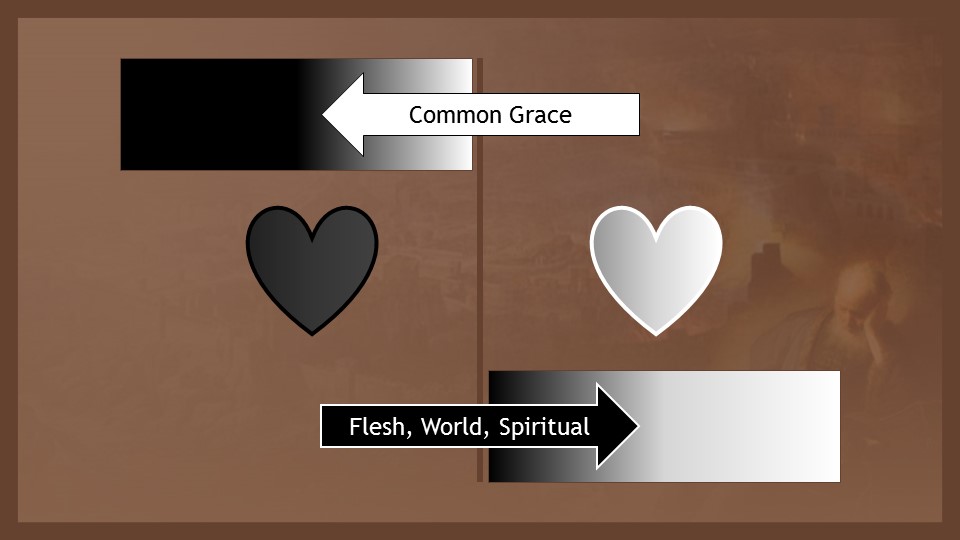
Cross References
- Eze 11:19 - And I will give them one heart, and a new spirit I will put within them. I will remove the heart of stone from their flesh and give them a heart of flesh,
- Jn 3:3 - Jesus answered him, “Truly, truly, I say to you, unless one is born again he cannot see the kingdom of God.”
- 1 Pe 1:3 - Blessed be the God and Father of our Lord Jesus Christ! According to his great mercy, he has caused us to be born again to a living hope through the resurrection of Jesus Christ from the dead,
- 2 Co 5:17 - Therefore, if anyone is in Christ, he is a new creation. The old has passed away; behold, the new has come.
- 2 Pe 1:4 - by which he has granted to us his precious and very great promises, so that through them you may become partakers of the divine nature, having escaped from the corruption that is in the world because of sinful desire.
References to “saint” - Eph 2:10 - For we are his workmanship, created in Christ Jesus for good works, which God prepared beforehand, that we should walk in them.
- Eph 4:24 - and to put on the new self, created after the likeness of God in true righteousness and holiness.
- Jn 17:16 - They are not of the world, just as I am not of the world.
- Ro 6:17–18 - But thanks be to God, that you who were once slaves of sin have become obedient from the heart to the standard of teaching to which you were committed, [18] and, having been set free from sin, have become slaves of righteousness.
- Mt 12:35 - The good person out of his good treasure brings forth good, and the evil person out of his evil treasure brings forth evil.
- Lk 8:15 - As for that in the good soil, they are those who, hearing the word, hold it fast in an honest and good heart, and bear fruit with patience.
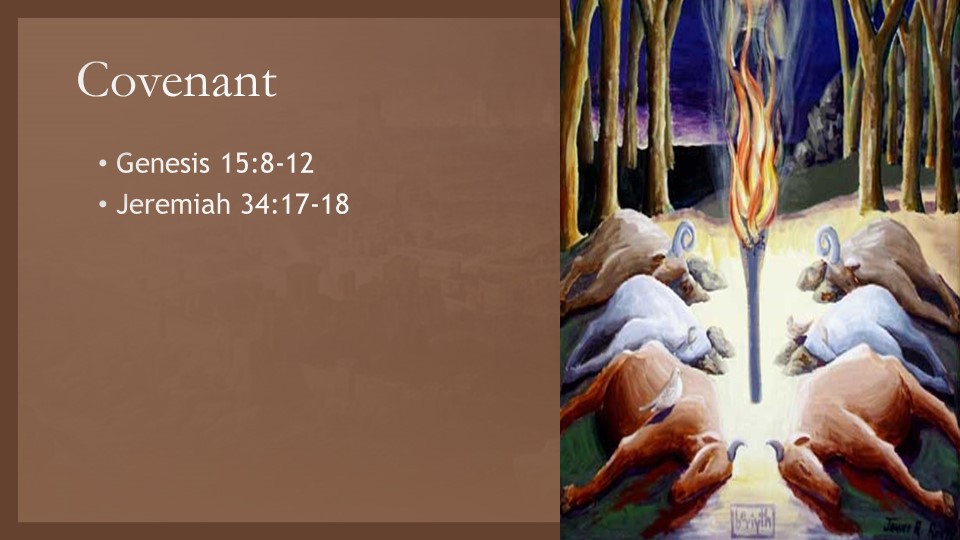
Covenant
The nature of "covenant" involves something much deeper than most modern minds conceive. As we have stated, before we can understand God's judgment in Jeremiah we must first understand the depth of meaning in covenant. The Hebrew word for covenant is berît (בְּרִית), which according to the Theological Wordbook of the Old Testament, means: “between nations: a treaty, alliance of friendship; between individuals: a pledge or agreement; with obligation between a monarch and subjects: a constitution; between God and man: a covenant accompanied by signs, sacrifices, and a solemn oath that sealed the relationship with promises of blessing for keeping the covenant and curses for breaking it” (TWOT, 128). Marriage is a contractual agreement biblically established by covenant.
The "making" or "cutting" of a covenant often involved an illustrative ceremony. Victor Hamilton notes that “the biblical world offers widespread evidence that animals were slaughtered in treaty contraction ceremonies. Some of these texts—but not all of them—suggest that the two parties to the treaty walked between the rows of freshly killed animal flesh, and in so doing placed a curse upon themselves if either party should prove disloyal to the terms of the treaty: May they too be torn apart if they are responsible in any way for violating the arrangement” (Hamilton, 430).
The covenant ceremony has been called a dramatized curse. In it the covenanting parties bind themselves by oath to a curse dramatized by the cutting in two of the animals. If either party should violate the covenant, the curse of "divorce" or "split in two" or "death by separation" was invoked. A powerful illustration of this is found in Genesis 15.
- Genesis 15:8–12 - But he said, “O Lord GOD, how am I to know that I shall possess it?” He said to him, “Bring me a heifer three years old, a female goat three years old, a ram three years old, a turtledove, and a young pigeon.” And he brought him all these, cut them in half, and laid each half over against the other. But he did not cut the birds in half. And when birds of prey came down on the carcasses, Abram drove them away. As the sun was going down, a deep sleep fell on Abram. And behold, dreadful and great darkness fell upon him.
- Genesis 15:17–18 - When the sun had gone down and it was dark, behold, a smoking fire pot and a flaming torch passed between these pieces. On that day the LORD made a covenant with Abram...
Now we turn to Jeremiah and Judah's covenant with the Lord. Her violation of her covenant vows by contractual agreement should result in the Lord's divorce of her; her death by separation from God.
Jeremiah 34:18–19 - And the men who transgressed my covenant and did not keep the terms of the covenant that they made before me, I will make them like the calf that they cut in two and passed between its parts— the officials of Judah, the officials of Jerusalem, the eunuchs, the priests, and all the people of the land who passed between the parts of the calf.
God is Sovereign; Man is Steward
God directs without error and man decides without excuse.
- Jeremiah 21:8 - “And to this people you shall say: ‘Thus says the LORD: Behold, I set before you the way of life and the way of death.
- Jeremiah 27:13 - Why will you and your people die by the sword, by famine, and by pestilence, as the LORD has spoken concerning any nation that will not serve the king of Babylon?
God will fulfill His covenant promises, but only those who are faithful will partake in the blessings. We must remember that God does not need us, He loves us; we are not His because of our performance, but because of His love.
In Jeremiah chapter 2, the Lord “lays out his case with the logic of a lawyer and the longing of a lover” (Ryken, 41). What we have in this chapter is the courtroom scene of the Lord and His grossly unfaithful wife. He employs several colorful illustrations to portray the deep spiritual and affectional defection of His bride. Each picture illustrates the insanity of apostasy.
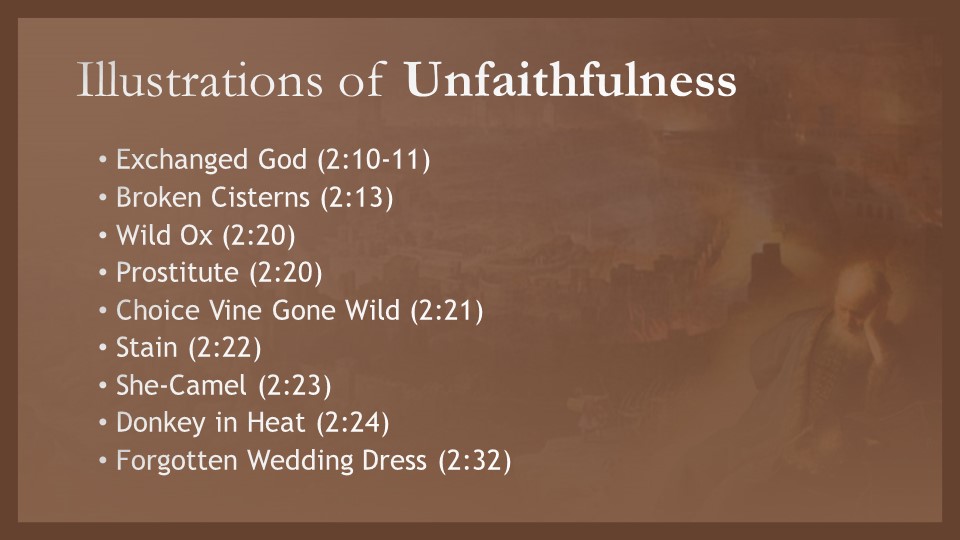
Illustrations of Unfaithfulness
#1 – Exchanged God (2:10-11)
No other nation has exchanged their god for other gods! No other nation forsakes their god. Other nations add to their gods, but they do not forsake their gods. The first sin brought in chapter 2 culminates in 38-39.
Judah is terribly confused: "who say to a tree [wood=feminine], ‘You are my father,’ and to a stone [masculine], ‘You gave me birth.’ For they have turned their back to me, and not their face. But in the time of their trouble they say, ‘Arise and save us!’" (Je 2:27).
The creation jury should: "Be appalled, O heavens, at this; be shocked, be utterly desolate, declares the LORD" ( Je 2:12).
#2 – Broken Cisterns (Jer 2:13)
In a desert … no water … crystal clear, cool, refreshing, life-giving water springing up: leave it? If leaving is bad, building a cistern as a replacement is worse.
Je 2:18 - And now what do you gain by going to Egypt to drink the waters of the Nile? Or what do you gain by going to Assyria to drink the waters of the Euphrates?
Leave God to turn to political alliances (Egypt, Assyria) for help when they are enemies (2:14-16, 36-37). This is portrayed in Lamentations 1:19: "I called to my lovers, but they deceived me."
“Politics is a broken cistern. When Christians trust in political solutions to save the nation, they bring judgment on themselves. One reason for the precipitous decline of the mainline church in America has been its engagement in liberal politics. And by aligning itself with the right-wing agenda, the conservative church has fallen into the same trap. The quest for political power destroys the spiritual influence of the church” (Ryken, 43).
Je 2:19 - Your evil will chastise you, and your apostasy will reprove you. Know and see that it is evil and bitter for you to forsake the LORD your God; the fear of me is not in you, declares the Lord GOD of hosts.
#3 – Wild Ox (Jer 2:20)
Je 2:20 - “For long ago I broke your yoke and burst your bonds; but you said, ‘I will not serve.’
Je 2:31 - … Have I been a wilderness to Israel, or a land of thick darkness? Why then do my people say, ‘We are free, we will come no more to you’?
#4 – Prostitute (Jer 2:20)
Je 2:20 - … Yes, on every high hill and under every green tree you bowed down like a whore.
Kidner describes her as “a restless wife to whom the bonds and burdens of true love were slavery, and the lure of the forbidden irresistible.” Judah has become so skilled in her wicked adulteries that even the pagan prostitutes can learn from her: "How well you direct your course to seek love! So that even to wicked women you have taught your ways" (Je 2:33). This is a detestable shame and scandal: one who takes upon the name of the Lord and worships another.
#5 – Choice Vine Gone Wild (Jer 2:21)
This cultivated vine turns on God (goes wild); planted correctly, nourished, etc., yet: corrupt, rotten branches contrary in nature to the stock!
#6 – Stain (Jer 2:22)
Sin is not just cosmetic. Nothing can wash it.
#7 – She-Camel (Jer 2:23b)
She is fickle, undisciplined, easily alarmed, and dashing mad. "Literally, this camel is criss-crossing her tracks. The young camel is the perfect illustration for all that is “skittery” and unreliable. It is ungainly in the extreme and runs off in any direction at the slightest provocation, much to the fury of the camel-driver. To sit in a village courtyard and watch such a young camel go scooting through, with some alarmed peasant dashing madly after it, is an unforgettable experience; such a young camel never takes more than about three steps in any direction. To this day the young camel provides a dramatic illustration for anything unreliable. Thus “interlacing her paths” is an accurate description of a young camel—it provides Jeremiah a perfect illustration for the fickleness of Israel." (K. E. Bailey and W. L. Holladay, "The 'Young Camel' and 'Wild Ass' in Jeremiah 2:23–25," Vetus Testamentum 18 (1968), 258–259).
#8 – Donkey in Heat (Jer 2:24a)
An illustration of the power of addiction.
Je 2:25 - Keep your feet from going unshod and your throat from thirst. But you said, ‘It is hopeless, for I have loved foreigners, and after them I will go.’
#9 – Forgotten Wedding Dress (Jer 2:32)
Illustrations of Judgment
- Boiling Caldron (Jer 1:13–16)
- Scorching Wind (Jer 4:11, 12; 18:17; 23:19; 25:32) — withering vegetation, discomfort
- Lions (Jer 2:15; 4:7; 5:6; 50:17) — power, strength, death
- Wolf (Jer 5:6) – ravenousness
- Leopard (Jer 5:6) – swiftness
- Stripped Branches (Jer 5:10) – fruitless, worthless (cf. Jn 15)
- Fire (Jer 5:14) – destruction, but not elimination (a purging fire) (cf. Mt 3:10)
- Shiloh (Jer 7:14) – a failed stewardship
- Serpents, Adders (Jer 8:17) – a picture of the curse; cannot be charmed away; irresistible. Consider: Num 21:6; John 3:14–17.
God’s judgment cannot be charmed. A sure curse is coming upon all who sin, but Christ is the antidote for the venom of sin; looking to Christ—purely by faith—can live! - Burned Olive Branches (Jer 11:16-17) – a divine judgment; a purging
Baal, god of storms / tree pictured as consumed by the lightening of God. Consider: Rom 11:13–24. - Uprooting (Jer 12:17) – a supremely sovereign hand; a warning to all (nations included)
Salvation: free and but not universal; exclusively available in God - Waistband Made Worthless (Jer 13:1–11) – spoiled design
Cleanliness, priestly role and character; Euphrates: Mesopotamia corrupting influence (beginning w/ Manassah); ruined it defiles. They were designed to cling to God, but instead they “stubbornly follow their own heart” (Je 13:10). They were intended to be “for Me a people, a name, a praise, and a glory” and this is linked to listening - Dashed Wine Jars (Jer 13:12–14) – bringing judgment upon themselves
“All the people will be filled with mental intoxication, a symbol of helplessness and confusion. Canaanite worship was characterized by drunkenness” (Feinberg, 463). “They indeed all knew that bottles were made for wine; but they did not understand that they were the bottles.” (Calvin) - Shattered Vessel (Jer 19:10, 11; cf. 22:28) – irrevocability of ruin
- Fire [God’s Word] (Jer 23:29) – melt a hardened heart
- Hammer [God’s Word] (Jer 23:29) – powerful to crush hard hearts & bring repentance (convicts & converts).
- Cup of Wrath (Jer 25:15) – confusion and incompetency
- Yoke (Jer 27:2; 28:13) – submission, servitude, captivity
- Hammer [Babylon] (Jer 50:23) – crushes
- Mountain of Destruction [Babylon] (Jer 51:25) – a powerful kingdom
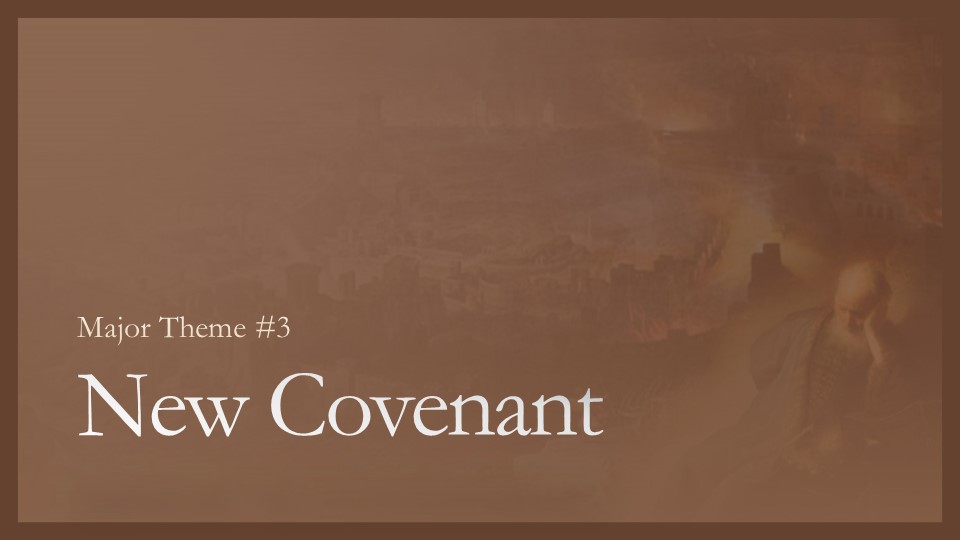
God Deals With Us in Covenants
I am so grateful that God deals with us through covenants. The concept of covenant is vital to the Christian life. A covenant represents a life-binding promise. So when God makes a covenant with us, He binds His promise to the absolute most trustworthy, powerful, and transcendent life in all of reality, namely Himself. Therefore, God’s covenant promises to us establish the rock-solid foundation of our hope and assurance.
From the human side, the idea of covenant touches upon the central nerve of faith. Our trust and hope rests entirely in God, with complete assurance that what He has promised will come to pass. So from God a covenant signifies an infinitely trustworthy promise, and for man it exemplifies a call to faith.
Israel’s Covenant Unfaithfulness
From our last session, we considered that the covenant (berit) ceremony in Genesis 15 represented “a dramatized curse.” As covenant vows were being pronounced, the passing between two halves of sacrificed animals was nothing less than a graphical statement aimed at illustrating the curse of covenant unfaithfulness—death by division of one life graphically illustrates divorce.
While Genesis 15 is with reference to the Abrahamic Covenant, a covenant that God swore by His own life without the inclusion of any other contingent party, the same principle of covenant binding was applied to the covenant made between God and the nation of Israel, administered through Moses (often referred to as the Mosaic Covenant). God’s covenant with Israel, however, did bind both parties (God and Israel) together as in a marriage. The consequences and curses of Israel’s grotesque unfaithfulness to the covenant that she made with the Lord takes up the majority of the Book of Jeremiah, being signaled in Jeremiah 34:18-19:
And the men who transgressed my covenant and did not keep the terms of the covenant that they made before me, I will make them like the calf that they cut in two and passed between its parts—the officials of Judah, the officials of Jerusalem, the eunuchs, the priests, and all the people of the land who passed between the parts of the calf.
Jeremiah teaches us that God is sovereign and man is steward. It reminds us that God directs without error and man decides without excuse. So Israel stands guilty of her unfaithfulness, without excuse.
In chapter 2, Jeremiah illustrates the insanity of apostasy. The book is filled with illustrations of judgment, all of which are intended to help us perceive the intensity of her just desert for personally defying her Husband and despising her covenant with Him. The judgment of God is the cry of justice against the criminal action of Israel against her God, based primarily on her covenant with Him. She has repeatedly and profusely committed spiritual adultery in the most grotesque of manners. Thus, the judgments proclaimed and illustrated in Jeremiah are designed to help us feel the weight of the evil of Judah’s sin in breaking covenant with God. The covenant drama of death by division should come to mind.
So after rehearsing Judah’s unfaithfulness and illustrating the covenant curses to which she is liable, we might summarize the Lord’s indictments as follows: “Because of your overt rejection of Me; because of your grotesque adulteries and unfaithfulness to Me, your Husband; because of your obstinacy, rebellion, unsubmissiveness, and disobedience; the First Covenant I made with you through Moses will not be the means of blessing upon you. Your vows have been broken and are in ruins; our marriage is destitute and altogether without hope.” It is at this very point that the reader is brought to the place of full anticipation of a complete divorce. The heaviness of the case against Israel is too great; she should be put to death (after all, this was the penalty of adultery). But, in the most unthinkable fashion, while the court is suspended with abated breath awaiting the final verdict of the Lord against Israel, the Lord cries out, “Return, O faithless children, declares the LORD” (Jer 3:14). Then, in chapter 31, the Lord announces the most amazing grace, “Again I will build you, and you shall be built, O virgin Israel! Again you shall adorn yourself with tambourines and shall go forth in the dance of the merrymakers” (Jer 31:4). Instead of divorcing His ambitiously adulterous bride, the Lord says that He will make her as a virgin and remarry her! This is beauty of the New Covenant, a remarriage with both continuities and discontinuities:
“Behold, the days are coming, declares the LORD, when I will make a new covenant with the house of Israel and the house of Judah, [32] not like the covenant that I made with their fathers on the day when I took them by the hand to bring them out of the land of Egypt, my covenant that they broke, though I was their husband, declares the LORD. [33] For this is the covenant that I will make with the house of Israel after those days, declares the LORD: I will put my law within them, and I will write it on their hearts. And I will be their God, and they shall be my people. [34] And no longer shall each one teach his neighbor and each his brother, saying, ‘Know the LORD,’ for they shall all know me, from the least of them to the greatest, declares the LORD. For I will forgive their iniquity, and I will remember their sin no more” (Jer 31:31–34).
God doesn’t need us or our works or our religion, He loves us. The New Covenant powerfully reminds us, through Israel, that we are not faithful, we are not righteous, we are not worthy of God’s covenant love. Our only hope is in Him—in His love, in His covenant faithfulness; not ours.
The New Covenant
The New Covenant corresponds to the (first, “old”) covenant that God made to Israel through Moses. Its “newness” stands in contrast to the Mosaic Covenant, not the Abrahamic Covenant.
It is important to note that embedded in the First Covenant, God had already made allusions to the inevitable necessity of the New Covenant. In Deuteronomy 10:16, He says, “Circumcise therefore the foreskin of your heart, and be no longer stubborn.” The lesson to be learned is not Israel, nor any man, can change his own heart. This is why, even within the First Covenant, the Lord said, “And the LORD your God will circumcise your heart and the heart of your offspring, so that you will love the LORD your God with all your heart and with all your soul, that you may live” (Dt 30:6). This is a clear allusion to the New Covenant, embedded within the old.
There is more meaning and blessing and grace and love in the New Covenant than any of us begin to appreciate. The importance of the New Covenant to biblical theology can hardly be overstated. Thus, this theme in the Book of Jeremiah is perhaps its greatest contribution to the Bible. “Expositors of all shades of conviction have written in glowing terms of the significance of this portion of the book. It has been acclaimed as one of the most important passages in the entire OT … Many expositors maintain that the concept of the new covenant is Jeremiah’s greatest contribution to biblical truth” (Feinberg, 574).
More Excellent Covenant
The Scripture presents the New Covenant as a more excellent covenant. Not that the First Covenant was not good, but that the New Covenant truly surpasses the first in glory because it centers on the excellencies of Christ.
Heb 8:7 - For if that First Covenant had been faultless, there would have been no occasion to look for a second.
At this point we must ask where was the “fault” in the First Covenant? Did God make a faulty covenant? Absolutely not! The fault rests entirely with Israel and not the covenant or God, which is the answer in the very next verse: “For he finds fault with them when he says…” (Heb 8:7).
[Hebrews 8:8-12 contains the longest New Testament citation of the Old Testament, quoting Jeremiah 31:31-34]
Heb 8:13 - In speaking of a new covenant, he makes the first one obsolete. And what is becoming obsolete and growing old is ready to vanish away.
So the First Covenant (Mosaic Covenant) is here called “obsolete” just as the vows used in a remarriage make the first vows effectively obsolete—all now rests on the “new” vows. Jeremiah alludes to this in 3:16-17, where the “ark of the covenant” symbolizes the Mosaic Covenant: “in those days, declares the LORD, they shall no more say, ‘The ark of the covenant of the LORD.’ It shall not come to mind or be remembered or missed; it shall not be made again. At that time Jerusalem shall be called the throne of the LORD, and all nations shall gather to it, to the presence of the LORD in Jerusalem, and they shall no more stubbornly follow their own evil heart.” By design, the First Covenant represented a shadow of the things to come, supremely as their substance is found in Christ.
- Heb 8:5 - They serve a copy and shadow of the heavenly things. …
- Heb 10:1 - For since the law has but a shadow of the good things to come instead of the true form of these realities, it can never, by the same sacrifices that are continually offered every year, make perfect those who draw near.
- Col 2:17 - These are a shadow of the things to come, but the substance belongs to Christ.
Since the First Covenant relied on the faithfulness not only of God but also of Israel in order for its blessings and fulfillments to be realized, it was not faultless. Fault was abundantly found in Israel. The lesson to be learned is that Israel, or any other, is not capable of covenant faithfulness to the Lord. If there is to be a marriage between God and man, God would have to meet all the terms on behalf of His bride—this is the New Covenant: a more excellent covenant.
This is what Hebrews 8:6 says, “But as it is, Christ has obtained a ministry that is as much more excellent than the old as the covenant he mediates is better, since it is enacted on better promises.”
Now, we must not conceive of the First Covenant (Old Testament) as faulty or bad, and the New Covenant (New Testament) as good. We should not see the testaments of the Bible as Law in the Old Testament and Gospel in the New Testament; as wrath in the old and love in the new. We commit a great dishonor to God and a great disservice to ourselves when we pit one testament against another; God against God.
I fear that many Christians today suffer from a low view of God in part because they do not understand the Old Testament and how it relates to them. We would do well to remember that the First Covenant with Israel was considered “gospel” or “good news.” In Deuteronomy 30:19–20 we read, “I call heaven and earth to witness against you today, that I have set before you life and death, blessing and curse. Therefore choose life, that you and your offspring may live, loving the LORD your God, obeying his voice and holding fast to him, for he is your life and length of days, that you may dwell in the land that the LORD swore to your fathers, to Abraham, to Isaac, and to Jacob, to give them.” A key statement, “for [God] is your life and length of days,” unmistakably reminds us that God is the gospel! The fact that God sought a relationship with Israel, that He saved her from the hopelessness of slavery and brought her through the wilderness to a land of promise, all illustrates the gospel. The gospel from the beginning of man’s existence has been the prospect of relationship with God; of truly knowing and fellowshipping with God, glorifying and enjoying Him.
So also in Hebrews, we read in “For good news came to us just as to them, but the message they heard did not benefit them, because they were not united by faith with those who listened” (4:2). Just a few verses later, “Since therefore it remains for some to enter it, and those who formerly received the good news [the Torah] failed to enter because of disobedience…” (Heb 4:6–7).
It was on the site of the First Covenant ceremony that the good news of the Lord was revealed: “The LORD, the LORD, a God merciful and gracious, slow to anger, and abounding in steadfast love and faithfulness, keeping steadfast love for thousands, forgiving iniquity and transgression and sin, but who will by no means clear the guilty, visiting the iniquity of the fathers on the children and the children’s children, to the third and the fourth generation” (Ex 34:6–7). So God was just as glorious, loving, merciful, and “good” in the Old Testament (First Covenant) as He is in the New Testament (New Covenant). Nevertheless, owing to human failure the First Covenant was designed to demonstrate the necessity of a New Covenant wherein God Himself would enact better promises bound to the faithfulness and excellencies of Himself.
More Excellent Promises
Heb 8:6 - But as it is, Christ has obtained a ministry that is as much more excellent than the old as the covenant he mediates is better, since it is enacted on better promises.
1. New Mediation (New High Priest: Christ)
In Jeremiah 31:31-34, the Lord says “I will” no less than seven times. This plainly anticipates a new means of establishing and maintaining the New Covenant. The Mosaic Covenant prescribed human priests to mediate access to God. They served at the temple in an important role of maintaining the Mosaic Covenant. The New Covenant in Christ fulfilled and supersedes with greater excellence the shadows of the First Covenant mediation.
Greater clarity of a new mediation is given in the Book of Hebrews:
- Heb 7:23–25 - The former priests were many in number, because they were prevented by death from continuing in office, [24] but he holds his priesthood permanently, because he continues forever. [25] Consequently, he is able to save to the uttermost those who draw near to God through him, since he always lives to make intercession for them.
- Heb 7:27 - He has no need, like those high priests, to offer sacrifices daily, first for his own sins and then for those of the people, since he did this once for all when he offered up himself.
- Heb 9:25–28 - Nor was it to offer himself repeatedly, as the high priest enters the holy places every year with blood not his own, [26] for then he would have had to suffer repeatedly since the foundation of the world. But as it is, he has appeared once for all at the end of the ages to put away sin by the sacrifice of himself. [27] And just as it is appointed for man to die once, and after that comes judgment, [28] so Christ, having been offered once to bear the sins of many, will appear a second time, not to deal with sin but to save those who are eagerly waiting for him.
- Heb 10:12 - But when Christ had offered for all time a single sacrifice for sins, he sat down at the right hand of God
2. New Atonement (New Sacrifice: Christ)
Imagine marriage vows that feature two unthinkable graces: (a) complete and irrevocable forgiveness and (b) personal payment on behalf of the adulteries of your spouse. Whereas the First Covenant prescribed animal sacrifices for the atonement of the sin of the people, the New Covenant is the First Covenant to actually promise forgiveness through the covenant to all the people in the covenant. This would be accomplished through a new sacrifice.
Je 31:34 - … “For I will forgive their iniquity, and I will remember their sin no more.”
Inherent to the First Covenant, was the repeat reminder of sin:
- Heb 10:1–3 - For since the law has but a shadow of the good things to come instead of the true form of these realities, it can never, by the same sacrifices that are continually offered every year, make perfect those who draw near. [2] Otherwise, would they not have ceased to be offered, since the worshipers, having once been cleansed, would no longer have any consciousness of sins? [3] But in these sacrifices there is a reminder of sins every year.
(see also Heb 10:4-13)
Whereas in the New Covenant, Christ’s sacrifice “has perfected for all time”—that is no repeat reminder of sin through repeat shadowy sacrifices. The substance has come and has brought perfect finality.
- Heb 10:14 - For by a single offering he has perfected for all time those who are being sanctified.
According to the First Covenant, saints were forgiven their sins through the exercise of their faith in God. As they brought their animal sacrifices, their demonstration of faith in obedience to the command of the Lord and trust in His provision to substitute the penalty of their sin on their sacrificial victim was perfectly accepted in the First Covenant economy. But those sacrifices were never efficacious in themselves to forgive sins. They were shadows, emblems, and graphic dramatizations of the substance and reality that alone can forgive sin. “For it is impossible for the blood of bulls and goats to take away sins” (Heb 10:4). All sacrifices performed by faith and according to the terms of the First Covenant would be made efficacious only in and through the sacrifice of Christ. - Heb 9:11–14 - But when Christ appeared as a high priest of the good things that have come, then through the greater and more perfect tent (not made with hands, that is, not of this creation) [12] he entered once for all into the holy places, not by means of the blood of goats and calves but by means of his own blood, thus securing an eternal redemption. [13] For if the blood of goats and bulls, and the sprinkling of defiled persons with the ashes of a heifer, sanctify for the purification of the flesh, [14] how much more will the blood of Christ, who through the eternal Spirit offered himself without blemish to God, purify our conscience from dead works to serve the living God.
3. New Personal Presence (Spirit Of Christ)
Je 31:33 - For this is the covenant that I will make with the house of Israel after those days, declares the LORD: I will put my law within them, and I will write it on their hearts. And I will be their God, and they shall be my people.
- Eze 36:26–27 - And I will give you a new heart, and a new spirit I will put within you. And I will remove the heart of stone from your flesh and give you a heart of flesh. [27] And I will put my Spirit within you, and cause you to walk in my statutes and be careful to obey my rules.
- Joe 2:28–32 - “And it shall come to pass afterward, that I will pour out my Spirit on all flesh; your sons and your daughters shall prophesy, your old men shall dream dreams, and your young men shall see visions. [29] Even on the male and female servants in those days I will pour out my Spirit. [30] “And I will show wonders in the heavens and on the earth, blood and fire and columns of smoke. [31] The sun shall be turned to darkness, and the moon to blood, before the great and awesome day of the LORD comes. [32] And it shall come to pass that everyone who calls on the name of the LORD shall be saved. For in Mount Zion and in Jerusalem there shall be those who escape, as the LORD has said, and among the survivors shall be those whom the LORD calls.
- Eph 1:13–14 - In him you also, when you heard the word of truth, the gospel of your salvation, and believed in him, were sealed with the promised Holy Spirit, [14] who is the guarantee of our inheritance until we acquire possession of it, to the praise of his glory.
- 2 Co 1:22 - and who has also put his seal on us and given us his Spirit in our hearts as a guarantee.
- 2 Co 5:5 - He who has prepared us for this very thing is God, who has given us the Spirit as a guarantee.
4. New Heart (Regeneration)
In the First Covenant, the Lord said through Moses, “Yet the LORD set his heart in love on your fathers and chose their offspring after them, you above all peoples, as you are this day. Circumcise therefore the foreskin of your heart, and be no longer stubborn” (Dt 10:15–16). Jeremiah echoed this First Covenant call, “Circumcise yourselves to the LORD; remove the foreskin of your hearts, O men of Judah and inhabitants of Jerusalem; lest my wrath go forth like fire, and burn with none to quench it, because of the evil of your deeds” (Jer 4:4). The problem is that man cannot change his own heart, that’s why the Lord said through Jeremiah, “Can the Ethiopian change his skin or the leopard his spots? Then also you can do good who are accustomed to do evil” (Jer 13:23). Therefore, foundational to the New Covenant is the promise of a new heart: “For this is the covenant that I will make … I will put my law within them, and I will write it on their hearts” (Jer 31:33).
Je 24:7 - I will give them a heart to know that I am the LORD, and they shall be my people and I will be their God, for they shall return to me with their whole heart.
- Eze 36:26–27 - And I will give you a new heart, and a new spirit I will put within you. And I will remove the heart of stone from your flesh and give you a heart of flesh.
- Ga 3:21–22 - Is the law then contrary to the promises of God? Certainly not! For if a law had been given that could give life, then righteousness would indeed be by the law. [22] But the Scripture imprisoned everything under sin, so that the promise by faith in Jesus Christ might be given to those who believe.
- Ro 8:2–3 - For the law of the Spirit of life has set you free in Christ Jesus from the law of sin and death. [3] For God has done what the law, weakened by the flesh, could not do. By sending his own Son in the likeness of sinful flesh and for sin, he condemned sin in the flesh
5. New Testimony (Internal Not External)
The vows of this covenant will not be engraved on stone (external), but on human tissue (internal). This stresses the internal nature of the New Covenant.
Je 31:33 - For this is the covenant that I will make with the house of Israel after those days, declares the LORD: I will put my law within them, and I will write it on their hearts. And I will be their God, and they shall be my people.
- Ex 24:7 - Then he took the Book of the Covenant and read it in the hearing of the people. And they said, “All that the LORD has spoken we will do, and we will be obedient.”
- Ro 7:6 - But now we are released from the law, having died to that which held us captive, so that we serve in the new way of the Spirit and not in the old way of the written code.
6. New Intimacy (Personally Revelatory)
The New Covenant will not be dependent on interpretation. It will involve an intimate, personal knowledge of God, fellowship with God, and the shalom of God.
Je 31:33-34 - For this is the covenant that I will make … I will be their God, and they shall be my people. And no longer shall each one teach his neighbor and each his brother, saying, ‘Know the LORD,’ for they shall all know me, from the least of them to the greatest, declares the LORD. For I will forgive their iniquity, and I will remember their sin no more.
- Jdg 2:10 - And all that generation also were gathered to their fathers. And there arose another generation after them who did not know the LORD or the work that he had done for Israel.
- Ho 4:1 - Hear the word of the LORD, O children of Israel, for the LORD has a controversy with the inhabitants of the land. There is no faithfulness or steadfast love, and no knowledge of God in the land;
- Je 9:23–24 - Thus says the LORD: “Let not the wise man boast in his wisdom, let not the mighty man boast in his might, let not the rich man boast in his riches, [24] but let him who boasts boast in this, that he understands and knows me, that I am the LORD who practices steadfast love, justice, and righteousness in the earth. For in these things I delight, declares the LORD.”
- Jn 17:3 - And this is eternal life, that they know you the only true God, and Jesus Christ whom you have sent.
- Heb 9:6–8 - These preparations having thus been made, the priests go regularly into the first section, performing their ritual duties, [7] but into the second only the high priest goes, and he but once a year, and not without taking blood, which he offers for himself and for the unintentional sins of the people. [8] By this the Holy Spirit indicates that the way into the holy places is not yet opened as long as the first section is still standing
- Heb 9:9 - (which is symbolic for the present age). According to this arrangement, gifts and sacrifices are offered that cannot perfect the conscience of the worshiper,
- Heb 9:14 - how much more will the blood of Christ, who through the eternal Spirit offered himself without blemish to God, purify our conscience from dead works to serve the living God.
- Heb 4:15–16 - For we do not have a high priest who is unable to sympathize with our weaknesses, but one who in every respect has been tempted as we are, yet without sin. [16] Let us then with confidence draw near to the throne of grace, that we may receive mercy and find grace to help in time of need.
7. New Enablement (New Power & Sufficiency)
Je 31:33 - For this is the covenant that I will make with the house of Israel after those days, declares the LORD: I will put my law within them, and I will write it on their hearts. And I will be their God, and they shall be my people.
- Eze 36:27 - And I will put my Spirit within you, and cause you to walk in my statutes and be careful to obey my rules.
- 2 Co 3:3–6 - And you show that you are a letter from Christ delivered by us, written not with ink but with the Spirit of the living God, not on tablets of stone but on tablets of human hearts. [4] Such is the confidence that we have through Christ toward God. [5] Not that we are sufficient in ourselves to claim anything as coming from us, but our sufficiency is from God, [6] who has made us sufficient to be ministers of a new covenant, not of the letter but of the Spirit. For the letter kills, but the Spirit gives life.
- Ro 2:29 - But a Jew is one inwardly, and circumcision is a matter of the heart, by the Spirit, not by the letter. His praise is not from man but from God.
8. New Extent (Eternal, Permanent)
Je 50:5 - They shall ask the way to Zion, with faces turned toward it, saying, ‘Come, let us join ourselves to the LORD in an everlasting covenant that will never be forgotten.’
- Heb 13:20 - Now may the God of peace who brought again from the dead our Lord Jesus, the great shepherd of the sheep, by the blood of the eternal covenant,
9. New Guarantor (God: Father, Son, & Spirit)
In Jeremiah 31-40, no less than nine times we read “the LORD says.” This hints not only to the promises themselves but to the Lord as the guarantor of those promises.
- Heb 6:17–18 - So when God desired to show more convincingly to the heirs of the promise the unchangeable character of his purpose, he guaranteed it with an oath, [18] so that by two unchangeable things, in which it is impossible for God to lie, we who have fled for refuge might have strong encouragement to hold fast to the hope set before us.
- Heb 7:20–22 - And it was not without an oath. For those who formerly became priests were made such without an oath, [21] but this one was made a priest with an oath by the one who said to him: “The Lord has sworn and will not change his mind, ‘You are a priest forever.’ ” [22] This makes Jesus the guarantor of a better covenant.
More Excellent Glory
The Book of Hebrews makes the New Covenant one of the central arguments for the supremacy of Christ in the lives of Christians (cf. 2 Cor 3-4)! The New Covenant effects a greater glory (2 Cor 3:7-8), a greater hope (2 Cor 3:12), and a greater perseverance (2 Cor 4:1).
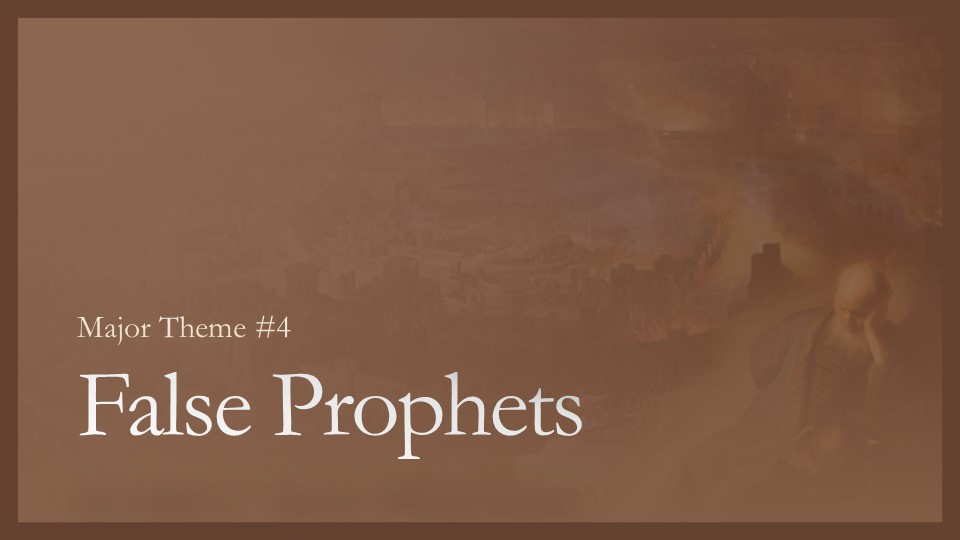
False Prophets
The fourth major theme in Jeremiah brings us to the study of false prophets.
From 609 B.C. (death of Josiah) to his death, Jeremiah was continually battling false prophets. “Three kinds of falsehood stirred him: (1) false security that refused all calls for repentance, (2) false prophets who lulled the people into dangerous complacency, and (3) the false worship of idols” (Feinberg, 369).
A key verse concerning the subject of false prophets is found in Jeremiah 5:30-31a, which reads,
"An appalling and horrible thing has happened in the land: [31] the prophets prophesy falsely, and the priests rule at their direction; … "
A) Culpability of the Leaders
Blame first goes to the spiritual leaders.
- Je 2:8 - The priests did not say, ‘Where is the LORD?’ Those who handle the law did not know me; the shepherds transgressed against me; the prophets prophesied by Baal and went after things that do not profit.
- Je 2:26 - “As a thief is shamed when caught, so the house of Israel shall be shamed: they, their kings, their officials, their priests, and their prophets
A dying ritual rather than a delighting relationship
- Je 8:8 - “How can you say, ‘We are wise, and the law of the LORD is with us’? But behold, the lying pen of the scribes has made it into a lie.
- Je 23:1–2 - “Woe to the shepherds who destroy and scatter the sheep of my pasture!” declares the LORD. [2] Therefore thus says the LORD, the God of Israel, concerning the shepherds who care for my people: “You have scattered my flock and have driven them away, and you have not attended to them. Behold, I will attend to you for your evil deeds, declares the LORD.
- Je 10:21 - For the shepherds are stupid and do not inquire of the LORD; therefore they have not prospered, and all their flock is scattered.
- Je 50:6 - “My people have been lost sheep. Their shepherds have led them astray, turning them away on the mountains. From mountain to hill they have gone. They have forgotten their fold.
- Mt 9:36 - When he saw the crowds, he had compassion for them, because they were harassed and helpless, like sheep without a shepherd.
Je 23:3–6 - Then I will gather the remnant of my flock out of all the countries where I have driven them, and I will bring them back to their fold, and they shall be fruitful and multiply. [4] I will set shepherds over them who will care for them, and they shall fear no more, nor be dismayed, neither shall any be missing, declares the LORD. [5] “Behold, the days are coming, declares the LORD, when I will raise up for David a righteous Branch, and he shall reign as king and deal wisely, and shall execute justice and righteousness in the land. [6] In his days Judah will be saved, and Israel will dwell securely. And this is the name by which he will be called: ‘The LORD is our righteousness.’
Jn 10:14–16 - I am the good shepherd. I know my own and my own know me, … [16] And I have other sheep that are not of this fold. I must bring them also, and they will listen to my voice. So there will be one flock, one shepherd. … [28] I give them eternal life, and they will never perish, and no one will snatch them out of my hand.
B) Culpability of the People
False teachers are a judgment on the people.
Je 5:31 - … my people love to have it so, but what will you do when the end comes?
Preach only what the people want to hear:
- Je 5:12–13 - They have spoken falsely of the LORD and have said, ‘He will do nothing; no disaster will come upon us, nor shall we see sword or famine. [13] The prophets will become wind; the word is not in them. Thus shall it be done to them!’ ”
- Je 14:13–16 - Then I said: “Ah, Lord GOD, behold, the prophets say to them, ‘You shall not see the sword, nor shall you have famine, but I will give you assured peace in this place.’ ” [14] And the LORD said to me: “The prophets are prophesying lies in my name. I did not send them, nor did I command them or speak to them. They are prophesying to you a lying vision, worthless divination, and the deceit of their own minds. [15] Therefore thus says the LORD concerning the prophets who prophesy in my name although I did not send them, and who say, ‘Sword and famine shall not come upon this land’: By sword and famine those prophets shall be consumed. [16] And the people to whom they prophesy shall be cast out in the streets of Jerusalem, victims of famine and sword, with none to bury them—them, their wives, their sons, and their daughters. For I will pour out their evil upon them.
Je 6:13–14 - “For from the least to the greatest of them, everyone is greedy for unjust gain; and from prophet to priest, everyone deals falsely. [14] They have healed the wound of my people lightly, saying, ‘Peace, peace,’ when there is no peace.
Such preachers and their preaching is a judgment upon the people!
- Je 5:14–15 - Therefore thus says the LORD, the God of hosts: “Because you have spoken this word, behold, I am making my words in your mouth a fire, and this people wood, and the fire shall consume them. [15] Behold, I am bringing against you a nation from afar, O house of Israel, declares the LORD. ...
George Whitefield (1714–1770): “As God can send a nation of people no greater blessing than to give them faithful, sincere, upright ministers, so the greatest curse that God can possibly send upon a people in this world is to give them over to blind, unregenerate, carnal, lukewarm, unskillful guides.”
- 2 Ti 4:2–3 - preach the word; be ready in season and out of season; reprove, rebuke, and exhort, with complete patience and teaching. [3] For the time is coming when people will not endure sound teaching, but having itching ears they will accumulate for themselves teachers to suit their own passions,
- Je 6:15 - Were they ashamed when they committed abomination? No, they were not at all ashamed; they did not know how to blush. Therefore they shall fall among those who fall; at the time that I punish them, they shall be overthrown,” says the LORD.
“Preaching that entertains more than it instructs, soothes more than it convicts, and appeases more than it confronts has become the rule rather than the exception in the evangelical church” (Ryken, 105).
H. Richard Niebuhr (1894–1963): “A God without wrath brings men without sin into a kingdom without judgment through the ministrations of a Christ without a cross.”
The Importance of God's Word
“Note that the Lord gave him no signs or miracles to confirm the validity of his predictions” (Feinberg, 370).
- Jeremiah 20:9 - If I say, “I will not mention him, or speak any more in his name,” there is in my heart as it were a burning fire shut up in my bones, and I am weary with holding it in, and I cannot.
- Je 23:29 - Is not my word like fire, declares the LORD, and like a hammer that breaks the rock in pieces?
- Jeremiah 23:9 - Concerning the prophets: My heart is broken within me; all my bones shake; I am like a drunken man, like a man overcome by wine, because of the LORD and because of his holy words.
- Jeremiah 23:28–29 - Let the prophet who has a dream tell the dream, but let him who has my word speak my word faithfully. What has straw in common with wheat? declares the LORD. Is not my word like fire, declares the LORD, and like a hammer that breaks the rock in pieces?
The Internalizing of God's Word
[Jer 23:9 – 40]
Je 23:16 - Thus says the LORD of hosts: “Do not listen to the words of the prophets who prophesy to you, filling you with vain hopes. They speak visions of their own minds, not from the mouth of the LORD.
Jer has been prophesying for 23 years by now! But:
Je 25:7 - Yet you have not listened to me, declares the LORD, that you might provoke me to anger with the work of your hands to your own harm.
Je 44:16 - “As for the word that you have spoken to us in the name of the LORD, we will not listen to you.
[Jer 27:1 – 29:32]
Je 27:8 - “ ‘ “But if any nation or kingdom will not serve this Nebuchadnezzar king of Babylon, and put its neck under the yoke of the king of Babylon, I will punish that nation with the sword, with famine, and with pestilence, declares the LORD, until I have consumed it by his hand.
Picture of the protection of discipline…
Ch 28 – Hananiah → false prophet!
- Broke the yoke from Jer.'s neck
- 2 months later Hananiah died!
Chapters 34-35
In these chapters, we see an historical outworking of God's word. Consequently, Jeremiah experiences suffering in chapters 37 and 38. By chapter 39, God's word comes to pass and Jerusalem is captured and destroyed. Jeremiah is released by the Babylonians, yet Judah still refuses to listen to him even after his words come to pass in their experience.
This prepares the reader for Ezekiel, a TRUE prophet in Babylon. The challenge to Jeremiah is this: you must withstand the false promises and false hopes and write down the true promises and true hopes for the captives and those to come.
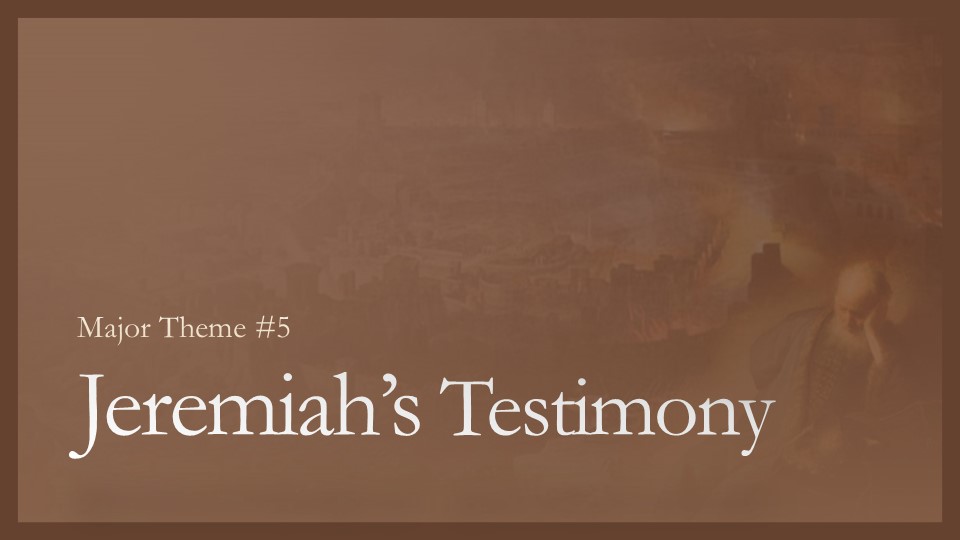
Jeremiah's Testimony
Suffering: Jer 1:18-19; 11:18-21; 15:19-21; 20:1-2; 26:7-24; 36:1- 26; 37:13-16; 38:1-6; 43:1-4
Complaints: Jer 11:18-12:6; 15:10-18; 17:14-18; 18:18-23; 20:7-18
The fifth major theme in the Book of Jeremiah is Jeremiah's own testimony. We find in the Book of Jeremiah more autobiographic material than in any other prophetic book. But this is not owing to a debased self-centeredness, rather Jeremiah writes more extensively about his circumstances because they serve as a testimony to the value and majesty of God.
A life so rendered to the unreserved purposes of God will certainly suffer hardships in this world that is opposed to God (cf. 2 Tim 3:12). The persecutions that Jeremiah suffered were wholly bound up with his message. VanGemeren says, "Hosea had already shown that the prophet's life and experience were closely bound up with his message. This tendency reaches its climax, however, in Jeremiah" (NIDOTTE, 4:765). Hardships were implied in Jeremiah's call to ministry. The Lord instructed him, "dress yourself for work; arise, and say to them everything that I command you." Clearly, this would involve much opposition and hostility, since the Lord then says, "Do not be dismayed by them, lest I dismay you before them." It would not be by a reduction of opposition or relief of difficulty, but rather by an increase of strength and emboldened resolve that the Lord would support Jeremiah through the trials that his ministry would bring. Jeremiah's strength is emphatically the Lord's personal work, "I, behold, I make you this day a fortified city, an iron pillar, and bronze walls, against the whole land, against the kings of Judah, its officials, its priests, and the people of the land. They will fight against you, but they shall not prevail against you, for I am with you, declares the LORD, to deliver you" (Jer 1:17–19).
This does not eliminate the anguish of heart that Jeremiah would experience. "My anguish, my anguish! I writhe in pain! Oh the walls of my heart! My heart is beating wildly; I cannot keep silent, for I hear the sound of the trumpet, the alarm of war" (Jer 4:19). His was a call of highest expense.
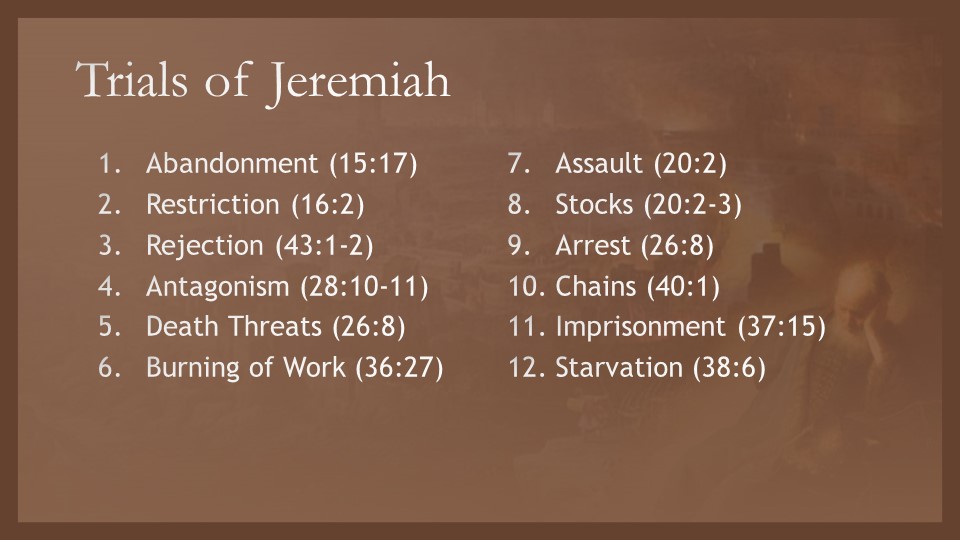
Trials of Jeremiah
Abandonment
Je 15:17 - I did not sit in the company of revelers, nor did I rejoice; I sat alone, because your hand was upon me, for you had filled me with indignation.
Restriction
Chapter 16 – desperate situation is so severe → DO NOT MARRY
Je 16:2 - “You shall not take a wife, nor shall you have sons or daughters in this place.
Why? → I am sparing you from such pain!
Rejection
Je 43:1–2 - When Jeremiah finished speaking to all the people all these words of the LORD their God, with which the LORD their God had sent him to them, [2] Azariah the son of Hoshaiah and Johanan the son of Kareah and all the insolent men said to Jeremiah, “You are telling a lie. The LORD our God did not send you to say, ‘Do not go to Egypt to live there,’
Antagonism
Je 28:10–11 - Then the prophet Hananiah took the yoke-bars from the neck of Jeremiah the prophet and broke them. [11] And Hananiah spoke in the presence of all the people, saying, “Thus says the LORD: Even so will I break the yoke of Nebuchadnezzar king of Babylon from the neck of all the nations within two years.” But Jeremiah the prophet went his way.
Death Threats
The people "devised plots against" him, saying, "let us cut him off from the land of the living" (11:19)!
Je 26:8 - And when Jeremiah had finished speaking all that the LORD had commanded him to speak to all the people, then the priests and the prophets and all the people laid hold of him, saying, “You shall die!
Burning Of Work
Je 36:27 - Now after the king had burned the scroll with the words that Baruch wrote at Jeremiah’s dictation …
Assault
Je 19:15–20:2 - “Thus says the LORD of hosts, the God of Israel, behold, I am bringing upon this city and upon all its towns all the disaster that I have pronounced against it, because they have stiffened their neck, refusing to hear my words.” [1] Now Pashhur the priest, the son of Immer, who was chief officer in the house of the LORD, heard Jeremiah prophesying these things. [2] Then Pashhur beat Jeremiah the prophet …
Stocks
Je 20:2–3 - Then Pashhur beat Jeremiah the prophet, and put him in the stocks that were in the upper Benjamin Gate of the house of the LORD.
Arrest
Je 26:7–8 - The priests and the prophets and all the people heard Jeremiah speaking these words in the house of the LORD. [8] And when Jeremiah had finished speaking all that the LORD had commanded him to speak to all the people, then the priests and the prophets and all the people laid hold of him …
Chains
Je 40:1 - The word that came to Jeremiah from the LORD after Nebuzaradan the captain of the guard had let him go from Ramah, when he took him bound in chains along with all the captives of Jerusalem and Judah who were being exiled to Babylon.
Imprisonment
Je 37:15 - And the officials were enraged at Jeremiah, and they beat him and imprisoned him in the house of Jonathan the secretary, for it had been made a prison.
Starvation
Je 38:6 - So they took Jeremiah and cast him into the cistern of Malchiah, the king’s son, which was in the court of the guard, letting Jeremiah down by ropes. And there was no water in the cistern, but only mud, and Jeremiah sank in the mud.
Owing only to his faithfulness as a servant of God!
Je 26:8 - And when Jeremiah had finished speaking all that the LORD had commanded him to speak to all the people, then the priests and the prophets and all the people laid hold of him, saying, “You shall die!
Perseverance
Yet Jeremiah continued to persevere. “No one in Judah was more patriotic; yet he never allowed himself to gloss over Judah’s sin” (Feinberg, 370). Wilkinson and Boa rightly remind us that “Jeremiah faithfully proclaims the divine condemnation of rebellious Judah for forty years and is rewarded with opposition, beatings, isolations, and imprisonment. His sympathy and sensitivity cause him to grieve over the rebelliousness and imminent doom of his nation. He often desires to resign from his prophetic office because of the harshness of his message and his reception, but he perseveres to Judah’s bitter end. He is the weeping prophet (Jer 9:1; 13:17)—lonely, rejected, and persecuted” (201).
Again, Feinberg insightfully notes, “His was a lonely and isolated life; though he longed for human fellowship and love, all his life he was denied a family and close friends. In spite of his deep love for his people, he was divinely compelled to proclaim almost monotonously their suffering and national doom. His fellowship with God was particularly deep and intimate” (370).
Through all of this, God sustained him. By the end of the book, Jerusalem is destroyed, but Jeremiah survives. This furnishes a clear testimony to glory of God – He delivered him as He promised.
Imprecation
Jeremiah's persevere was not without complaint, however, and often was accompanied with imprecation against his persecutors (cf. Jer 12:1-6; 18:21–23). Consider the striking contrast of emotions expressed in the same breath:
- Jeremiah 20:13 - Sing to the LORD; praise the LORD! For he has delivered the life of the needy from the hand of evildoers.
- Jeremiah 20:14 - Cursed be the day on which I was born! The day when my mother bore me, let it not be blessed!
“These imprecations are explicable on the same basis as those in the Psalms and should be understood as involving no feeling of personal vindictiveness. Jeremiah knew he was God’s messenger; therefore, those who attacked him were arraying themselves against God. Jeremiah’s intense fidelity to his God and his longing for the triumph of divine righteousness show that his curses were not so much personal as uttered for the vindication of the glory of the Lord. The OT saints, moreover, had no clear revelation of future retribution (cf. Job, who pleads incessantly for vindication in this life)” (Feinberg, 370–371).
Jeremiah complained to God, but he did not complain before the people (Jer 12:1). Referring to Jeremiah 12:1-6, Feinberg comments, “Some scholars labeled this passage Jeremiah’s harshest and bitterest prayer for vengeance (so Hyatt et al.). With transparent honesty, he bares his heart. These imprecations are best understood in the light of the following: (1) Jeremiah’s enemies were not merely personal ones but enemies of God and his truth (so the imprecatory psalms), and his was not a vindictive cry for personal revenge; (2) life after death and retribution in the afterlife were not clearly revealed in OT times; and (3) Jeremiah delivers the people judicially to the course they have chosen for themselves (v.15; cf. Matt 23; Gal 5:12)” (494).
Again, Jeremiah is emotively expressive in chapter 18 (Jer 18:18-23). “Here is the outcry of the prophet’s wounded heart (v.23). He realized the depth of the resentment and hatred toward him. Their plans had been concealed, but the Lord knew every secret plot against him (cf. the parallel in Ps 141:9–10). For Christians in similar situations the norm is in Matthew 5:44 and Romans 12:20. Even then it was personally enjoined in Proverbs 25:21–22. There is a basic distinction between personal and judicial vengeance” (Feinberg, 495).
But even in the midst of tremendous persecution and pain, the Lord is to be praised. The Lord is always to be praised. After addressing Pashur, the false prophet, in response to the persecutions that resulted from his hostilities toward Jeremiah, he expresses heartfelt worship:
"But the LORD is with me as a dread warrior; therefore my persecutors will stumble; they will not overcome me. They will be greatly shamed, for they will not succeed. Their eternal dishonor will never be forgotten. O LORD of hosts, who tests the righteous, who sees the heart and the mind, let me see your vengeance upon them, for to you have I committed my cause. Sing to the LORD; praise the LORD! For he has delivered the life of the needy from the hand of evildoers" (Jer 20:11-13). His response consists of (a) a confession of faith, (b) a prayer for deliverance, and (c) a hymn of praise. It reminds us of Paul and Silas in the midst of harsh impronsinment for the name of Christ, "About midnight Paul and Silas were praying and singing hymns to God, and the prisoners were listening to them" (Acts 16:25).
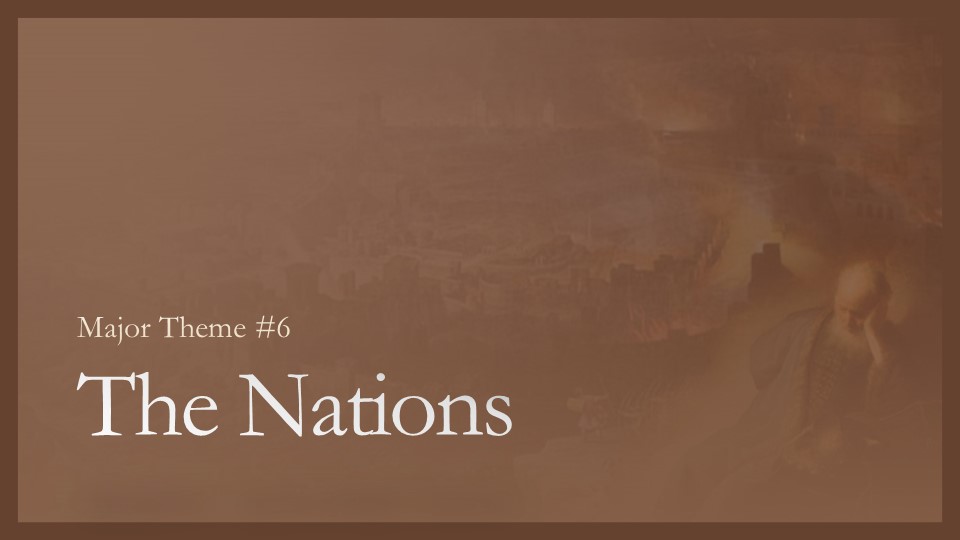
6. The Nations
(Jer 1, 25, 46-51)
As we get closer to the cross, we find God's word increasingly becomes more international in its address.
Many nations are involved in God’s purposes with Israel. “These chapters are a series of prophetic oracles against nine nations: Egypt, Philistia, Moab, Ammon, Edom, Damascus (Syria), Arabia, Elam, and Babylon. Only Egypt, Moab, Ammon, and Elam are given a promise of restoration.” (Boa, 202).
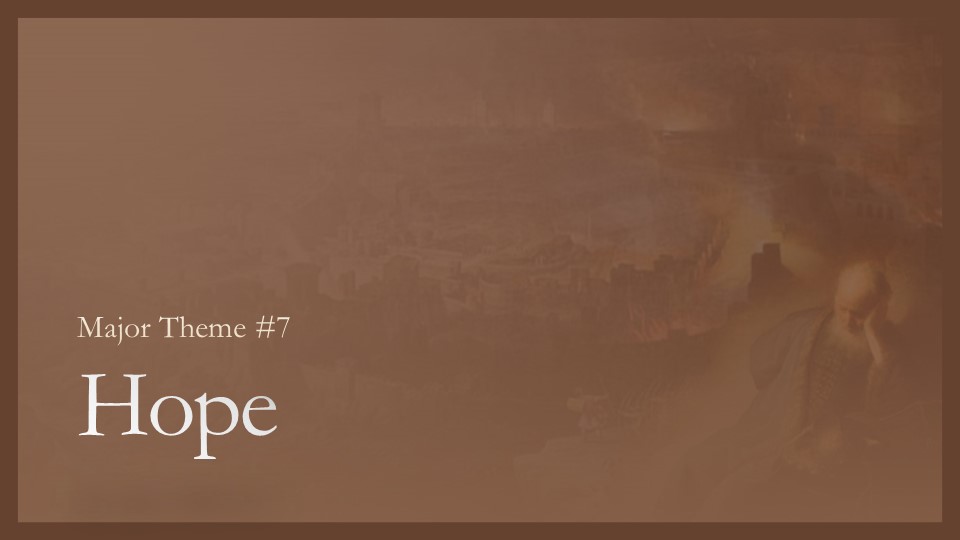
7. Hope
(Judah & Israel: Jer 1:10; 3:11-4:2; 12:15; 16:14-15; 23:1-8; 24:4-7; 30:1-33:26; 46:27-28; 50:4-5, 19-20, 34)
(The Nations: Jer 46:26b; 48:47; 49:6, 39)
There is much judgment, but the LORD's final words are “rebuild” and “plant”:
Jeremiah 1:10 - "See, I have set you this day over nations and over kingdoms, to pluck up and to break down, to destroy and to overthrow, to build and to plant.”
Here 4 verbs are used to describe the greater burden of Jeremiah's ministry, but God’s final word is “build” and “plant”! Chapters 30-34 contain the most consentrated message of hope in Jeremiah.
The glorious hope presented in Jeremiah includes:
- The New Covenant (anticipated in Deut 29-30)
- The Davidic and Priestly Covenants (Jer 33)
- Explicit, Finite Limitation to the Exile (70 years)
All of the trials and judgments prove to serve as divine disicpline for the true Israel within Israel primarily because the judgments are limited and future restoration is promised. As a national entity the promises of a new covenant, the restoration of David's throne, and the priesthood, all serve to furnish concrete hope for those of Israel who are true children of God, for future generations of God's people, including the nations. “Jeremiah had faith in the Lord and in his ultimate purpose for Israel and the nations. In spite of impending disaster on Judah, he found solid ground for confidence. Through all his denunciations he saw God’s final aim to bless his people, whether the remnant in the land or the exiles in Babylon (29:1–14; 32:1–15). His prophecies of Israel’s restoration are among the most glowing in the Bible (3:14–18; 30:18–22; 31:1–14; 33:10–13)” (Feinberg, 371).
All of the judgments and hopes serve no higher end than to make much of Christ! Each of the hopes emphasized in Jeremiah direct particularly attention to the Messiah. He will be the One who establishes and ratifies the New Covenant. He will be the One who stands in and serves as the final fulfillment of the Davidic role and covenant. He will be the One who fulfills and forever personally maintains the priestly mediation between a holy God and sinful man. He alone is the reason for the limitation of judgment and the hope of the nations.
Synopsis
A Book of Heaviness and Hope
Jeremiah is a book of prophecy that contains many very strong and challenging words of rebuke, indictment, judgment, and lamentation, particularly against Jerusalem. It is one of the largest books in the Bible. In fact, by word count, the Book of Jeremiah is longer than any of the other prophetic books. At the very beginning, it is clear that the Lord (YHWH) "appointed [Jeremiah] a prophet to the nations" (1:5) even though his predominant responsibility was to "go and proclaim in the ears of Jerusalem" (2:2).
Immediately one major theme emerges, which is the importance and certainty of God's word. "The word of the Lord" is a phrase that is found Jeremiah approximately 52 times. In the opening verses of the first chapter, at the commissioning of Jeremiah, the Lord says to him, "Behold, I have put My words in your mouth. . . appointed . . . to pluck up and to break down, to destroy and to overthrow, to build and to plant" (1:10). It was by the word of the Lord over against the dreams of the false prophets that the Lord distinguished His truth and true prophets. The Lord's word indeed presents many hope-filling promises and secure blessings for those who love God, and it is the same word that guarantees judgment against sin—"Is not My word like fire?” declares the Lord, “and like a hammer which shatters a rock?" (23:29). In view of His judgments, it was the surety of the Lord's word that aroused Jeremiah's desperation throughout his ministry. It is evident that Jeremiah knew and believed that the Lord was "watching over [His] word to perform it" (1:12). The Lord specified the basic charge given to Jeremiah when He said, “I will pronounce My judgments on them concerning all their wickedness, whereby they have forsaken Me and have offered sacrifices to other gods, and worshiped the works of their own hands" (1:16; cf. 2:13).
This presents another theme that is consequential to the theme of God's judgment being delivered through a man to men, namely the severe opposition and even persecution of Jeremiah. This was no surprise, as the Lord foretold him that the recipients of his message "will fight against [him]" (1:19). Indeed, the people "devised plots against" Jeremiah, saying, "let us cut him off from the land of the living" (11:19)! Later they seized him and declared, "you must die!" (26:8), yet Jeremiah continued to endure. His endurance was not without complaint, however, and often was accompanied with imprecation against his persecutors (cf. 12:1-6; 18:21–23). This theme of unjust persecution, owing only to his faithfulness as a servant of God, seems to characterize Jeremiah's ministry and may have given rise to the association between Jesus and Jeremiah made by some (cf. Matt 16:14).
In contrast to Jeremiah's persecution, due to his faithfulness to the word of the Lord, another major theme surfaces, namely that of the problem and the danger of false prophets. The Lord's rebuke is clear, “Do not listen to the words of the prophets who are prophesying to you. They are leading you into futility; They speak a vision of their own imagination, Not from the mouth of the Lord" (23:16). Although Jeremiah's message was intense and greatly convicting, he himself lamented and wept with grief over his people's sins (cf. 9:1; 13:17), and knew that the Lord's message was ultimately one to promote repentance, understanding, and a change of heart—all very good and blessed ends.
It is in this context that the Lord discloses His marvelous promise, that He "will make a new covenant with the house of Israel and with the house of Judah . . . for I will forgive their iniquity, and their sin I will remember no more" (31:31, 34). The promise of a new covenant and a future restoration of the nation of Israel are the ultimate themes of hope. Jeremiah prophecies that Jerusalem will be destroyed, that judgment has come to the house of Judah and she will be exiled because of her spiritual adultery (idolatry), unfaithfulness to her covenant, and her wicked heart. Yet, the Lord ensures that a true Shepherd, a righteous Branch of David, even “the Lord our righteousness” will restore justice and righteousness to the land! All is ordered to make much of Christ.
A Book Concerned with Covenants
Rich in covenant language and allusions, the Book of Jeremiah repeatedly addresses Judah on the basis of her past, present, and future relationship to Yahweh. The very first word of the Lord that came to Jeremiah to be explicitly conveyed to Judah emphatically expressed Yahweh's remembrance of Israel's devotion to Him in "the love of your betrothals" (2:2). "The fact that a special type of covenantal relationship existed between God and Israel was one of the most strongly marked aspects of Jeremiah's message" (TOTC, 38). Reaching back to the Lord's delivery of Israel from the bondage of Egypt and His lead of her through the wilderness, the Lord reminds Judah of her past commitment and fidelity to Him. "Warmth, love, and purity marked her first relationship with her covenant God. Apart from the golden-calf incident (Exod 32:1–29), Israel's failures in the wilderness came from lack of faith rather than outright apostasy" (EBC, 388).
In contrast to her former days, when her Lord called her and she responded, when the demonstration of His love and faithfulness to His covenant vows were first realized and her response was one largely of loyalty and faithfulness to her Lord, the Book of Jeremiah quickly points out her current unfaithfulness as an indictment and reproach. "For My people have committed two evils: They have forsaken Me, The fountain of living waters, To hew for themselves cisterns, Broken cisterns That can hold no water" (Jer 2:13). It is clear by this indictment that Jeremiah's contextual charges of unfaithfulness and apostasy relate faithfulness to covenant fidelity and not necessarily in the simple sense of belief or disbelief. The Book of Jeremiah views Judah's current excesses in idolatry, treachery, selfishness, and immorality as multiplied infractions against her covenant commitment to Yahweh as avowed at Mount Sinai. "They had broken the marriage covenant by their infidelity in going after impure lovers" (EBC, 388). The Old Covenant was a contractual constitution between Yahweh and His people Israel, initiated by God's grace toward His redeemed (Deut 9:26; 13:5; 21:8). "Under its provisions Israel became the adopted people of God and committed themselves to the necessity of observing the covenantal stipulations (Ex 24:7)" (TOTC, 38). So even though the Old Covenant was built upon the grace of God, there were very clear responsibilities on the part of Israel to adhere to a holy character in order to remain in union with her holy God. The imminent judgments, proclaimed by Jeremiah, were clearly due to "all the adulteries of faithless Israel" (3:7) whereby "they broke their covenant with the Lord their God and worshiped and served other gods" (22:9)—unmistakably Deuteronomic language that reminds the people of Judah of the consequences for unfaithfulness set out in the Old Covenant.
In the Book of Jeremiah, it is the powerful and pervasive thrust of Israel's unfaithfulness to the Old Covenant that gives particular rise to the revelation of the New. "Many expositors maintain that the concept of the new covenant is Jeremiah's greatest contribution to biblical truth" (EBC, 574). Two vitally essential elements of the New Covenant specifically address Israel and Judah's failed condition concerning the Old, namely, forgiveness of sins and a new heart that will personally and intimately know and desire fellowship with God! Its promise speaks to both the northern (Israel) and the southern (Judah) tribes of the covenant nation (31:31). This accentuates the principle of future unity and restoration—with God, the land, and each other, and secures the understanding that the very nation that broke the Old Covenant will be renewed to a more personal, close, and inner motivated relationship with the Lord in the future!
Chapters
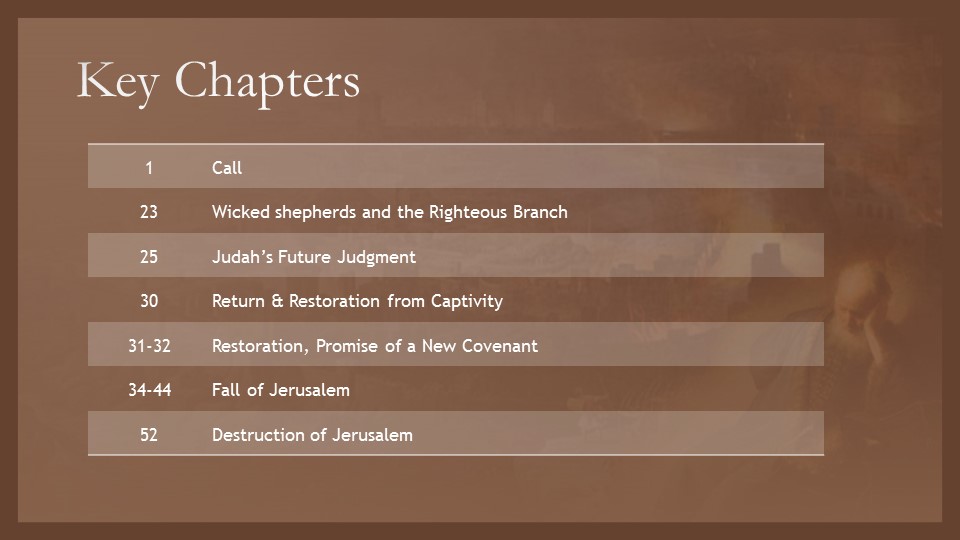
Chapter 1: The call of Jeremiah and the charge & empowerment given to him by the LORD Chapter 2: Rebuke to Jerusalem and Judah for her apostasy Chapter 3: Israel's harlotry, pollution of the land, & and now Judah; Repentance & restoration proclaimed Chapter 4: The warning of invasion, judgment, and the prophet's lament over Judah's devastation Chapter 5: The stubbornness of Jerusalem, her wickedness, and coming judgment Chapter 6: The cry of imminent siege, willful deafness of Jerusalem; Enemy from the north Chapter 7: Rebuke of vain worship, deceptive words, and false security in the temple Chapter 8: Jerusalem is choosing death rather than life; God's rebuke & judgment; more lamentation Chapter 9: Cries of lament, indictments for multiple sins, warnings and knowing God Chapter 10: Folly & delusion of idolatry contrasted to the truth of God; Consequences & plea for justice Chapter 11: Call to hear the words of the covenant; Indictment of Judah for idolatry; Threats to Jeremiah Chapter 12: Jeremiah entreats God's judgment on the nations; God's compassion toward the nations Chapter 13: Waistband object lesson; Judah's captivity proclaimed; Woes to Jerusalem Chapter 14: Drought as judgment; Plea for mercy and rebuke of false prophets Chapter 15: The LORD is resolute; Horrible judgment must come, yet deliverance for those who repent Chapter 16: God declares His withdrawal of His peace because of Judah's sin; Promise of restoration Chapter 17: Judah's sin begins in their heart; Trust in God is blessing; Call to observe Sabbath for peace Chapter 18: The object lesson with the potter and the clay; Issues of the heart; Jeremiah's cry to God Chapter 19: Message of judgment at Ben-hinnom with object lesson of shattered pottery Chapter 20: Pashur beats and imprisons Jeremiah, Jeremiah cries out to God; Curses his own birth Chapter 21: Message to Zedekiah concerning Nebuchadnezzar's attack & Jerusalem's fall Chapter 22: Message to the king of Judah about kings; Warning & foretelling of Babylonian exile Chapter 23: Woe to the shepherds; Prophesy of the Righteous Branch; Messiah will come Chapter 24: Object lesson with good/bad figs and the captives of Judah & those abandoned Chapter 25: The Word of the LORD spoken & written concerning Judah's captivity; Judgment of nations Chapter 26: Jeremiah ordered to warn Jerusalem; Plot to murder Jeremiah; Reasoning & relent Chapter 27: Prophecies concerning nations submission to Babylon; Temple vessels Chapter 28: Hananiah's false prophecy and death Chapter 29: Message to the exiles; Denunciation of the false prophet Shemaiah Chapter 30: Restoration of Judah & Israel foretold; The Greater David will rule in His rightful place Chapter 31: The promise of future comfort, joy, and forgiveness through a new covenant Chapter 32: Jeremiah's imprisonment by Zedekiah, his questioning, and prayer; Explanation from God Chapter 33: Prophecy of Israel's restoration to the land and the promise of a righteous Branch of David Chapter 34: Prophecy to Zedekiah; God's name profaned by the reclaiming of slaves; Destruction foretold Chapter 35: Obedience and reward of the Rechabite's in contrast to the disobedience & rebuke of Judah Chapter 36: Baruch writes what Jeremiah dictates; The king burns it; God calls Jeremiah to replace it Chapter 37: False security in Egyptian alliance; Jeremiah warns the king & is imprisoned Chapter 38: Jeremiah thrown into a cistern, is rescued out and brought to Zedekiah for questioning Chapter 39: Nebuchadnezzar captures Jerusalem; Zedekiah bound & his family slain; Jeremiah spared Chapter 40: Jeremiah is encouraged to remain in Judah by the captain of the guard; Johanan lies Chapter 41: Ishmael murders Gedaliah and takes captive the remnant of Mizpah; Johanan rescues them Chapter 42: The remnant entreats Jeremiah to pray to God concerning His will for them Chapter 43: The remnant rejects the word of the LORD as a lie, disobeys God, and enters Egypt Chapter 44: The LORD declares judgment, via Babylon, against all who provoke Him to anger in Egypt Chapter 45: Address to Baruch, warning not to seek great things for himself and promise of blessing Chapter 46: Defeat of Egypt and its strength by Babylon; Reassurance to Israel that God will deliver Chapter 47: The word of the LORD concerning the destruction of the Philistines Chapter 48: The word of the LORD concerning the destruction and judgment of Moab Chapter 49: Prophecies of judgment against Ammon, Edom, Damascus, Kedar, Hazor, and Elam Chapter 50: The word of the LORD concerning Babylon's coming judgment and desolation Chapter 51: Continued words of prophecy concerning judgment and the end of Babylon due to her sins Chapter 52: The historical account of Babylon's siege of Jerusalem, its plunder, and tally of exiles
